#Data General Eclipse
Explore tagged Tumblr posts
Text
74hc123 application circuit, 74hc logic, 74hc or gate, flip-flops
74HC Series 6 V Dual Retriggerable Monostable Multivibrator with Reset - TSSOP16
#Logic#74 Series A/HC/T#74HC123PW#118#Nexperia#application circuit#74hc logic#74hc or gate#flip-flops#74hc not gate#Data General#74hc multiplexer transistor#Data General Eclipse#transistor logic (TTL) integrated circuits
1 note
·
View note
Photo

Data General Eclipse and terminals.
107 notes
·
View notes
Text
ITS MAY YOU KNOW WHAT THAT MEANS

FISH
That's right! I've got bois for this Mermay!! I don't have their faces just yet, but they'll be getting their own sheets very soon with each getting a post. When I have them posted, I'll link them here!
Sun
Moon
Eclipse
Basic info on this AU:
- Semi hibernate? Their burrow is large enough for the three of them to curl up with one another and call it good for few months. Sun on repeat is the first to wake. He likes chewing on the ice for frozen fish
- NONE OF THESE FUCKERS ARE REMOTELY RELATED
- Moon is really the only one with the Crescent motif due to scarring
- these three are not very good with human interactions due to past instances with the older generations
- Our MC is a bit more sensitive things that should hurt or inconvenience them is going to make them upset
- Gonna do my best to keep it ambiguous, tho any smut writing I do will be AFAB cause I'm a baby and still getting comfortable with writing AMAB smut be gentle with me ;u;
MC Information:
- Bought the lake house to continue personal hobby of photography
- works remote from home on data entry
- Will remain mostly ambiguous through story, but is AFAB
- Goes by They/Them
- Vague backstory, allows reader to more seamlessly insert themselves in (Was raised in the area so its not completely alien to them)
Property Information:
- House is a 3 br 2 bth
- rather small. Smaller rooms and bathroom downstairs, master bedroom + bathroom. Separate closet space for storage
- the lake is mostly on a nature preserve, a small private section to MC's lake house + dock
- private area happens to be where the mers took up residence
- The lake isn't small, but it's not massive either, could easily swim from 1 side to the other under an hour
- Lake is mostly clear, the floor made up of natural water grasses and other green growth + logs
- Fishing is allowed, but restricted year round for specific species
- Sun, Moon, and Eclipse are not recorded due to their skittish nature
- House is very much a fixer-upper. Gonna give MC something to do
#fnaf moon#fnaf sun#fnaf eclipse#digital art#fnaf dca#fnaf au#dca au#mermay#dca mermay#Starlit Ripples#pronglezfic#pronglezartz#heehee hoohoo#mer sun#mer moon#mer eclipse
193 notes
·
View notes
Text
From the article:
It’s difficult to overstate how rapidly Australians have embraced solar power, and how much it has exceeded expectations. In 2011, the forecast was that rooftop solar would eventually contribute 4 terawatt hours of electricity. In the context of the Australian grid, this was next to nothing – barely 2% of total generation. For some, it raised the question of whether it was really worth the cost. More than a decade on, that number has been eclipsed more than six times over in the five eastern states connected by the country’s main power grid. Rooftop solar panels connected to the National Electricity Market generated 24.6TWh over the last year of data. Put another way, homes have contributed 11.6% of electricity – nearly as much as wind farms, comfortably more than large-scale solar farms or hydro plants, and twice as much as gas-fired power. More than 3.7m households and small businesses have solar systems. It means more than one in three homes across the country generate their own power when the sun is out.
#good news#solar power#hope#hopepunk#solar bunk#sustainable energy#green energy#climate change#global warming#environment#climate anxiety#ecoanxiety
400 notes
·
View notes
Text
I CAN SEE YOU
4 artists and a liar (lawyer)





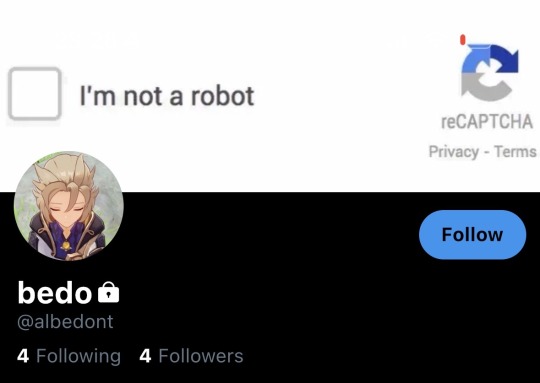


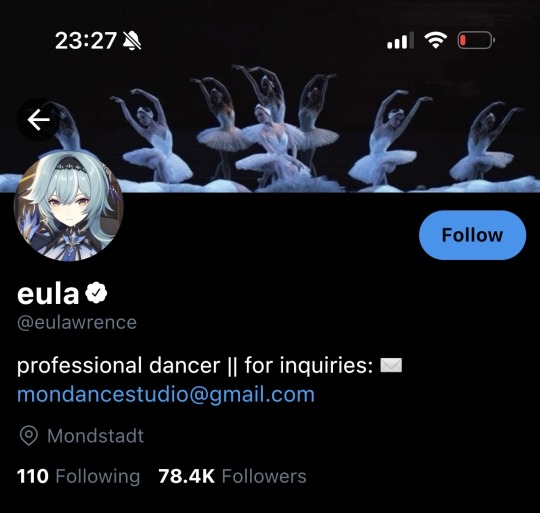

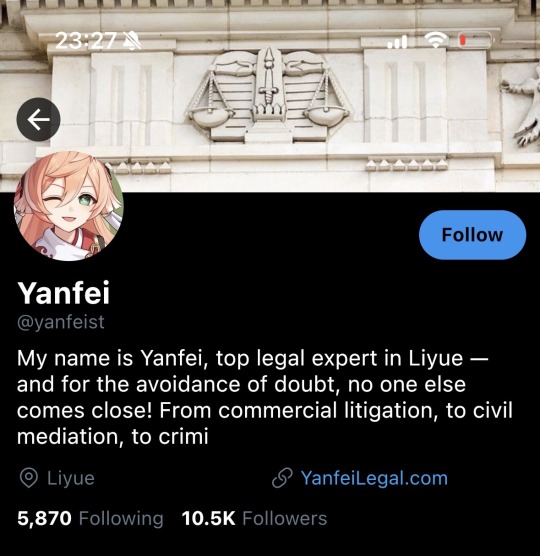


[Name] — renowned painter. as a member of the current generation of the lawrence clan, an old prominent family in mondstadt, you are expected to show proper decorum at all times, as well as perform what is expected of you. unbeknownst to all, behind the well-maintained and rehearsed facade is someone who deeply admires a famous solo artist from inazuma. deep enough to dedicate a stan account for him.
Albedo — also a renowned painter. a good friend of yours that you made during college, when you were taking up your fine arts major. him being adopted into your friend group just kind of happened naturally, as the two of you were an inseparable pair during college.
Venti — a random guy that you and albedo randomly adopted when an elective class required the students to divide themselves into groups of three. being the free and sociable guy that he is, he didn’t find it hard to make close connections with you and your friend. venti is now a decently known poet who hides under the penname ‘barbatos’. would sometimes get too drunk and tweet on his official writer account, which would then lead to his fans wrecking their brains trying to decipher what this ‘new poem’ means.
Eula — the relative you are closest to (the only one you’re close with, actually). your cousin who has a deep passion for dancing. long ago, she has made the decision to pursue this passion of hers, which led to her being the black sheep of the family. however, eula has no regrets as her career as a dancer turned out to be very successful. she has won competitions, performed on international stages, and has also gained social media traction.
Yanfei — eula’s friend who is a lawyer. similar to albedo, she just naturally fit into your friend group, with how often you and your friends meet with her and eula. despite having the title of ‘attorney’ attached to her name, yanfei remains humble and righteous, a quality that you all love and appreciate. sometimes feels a little sad as she is now based and residing in liyue, while this certain friend group of hers stays in mondstadt.

I CAN SEE YOU — scara x reader smau
masterlist .

TAGLIST I (closed)
@kararisa @aries-afk @aetherialcrafter @jamieexistss @lordbugs @aerisellesuchi @adres-tia @luvlockettt @kinichval @miiltrix @suzueuieeeee @automaticpatroltragedy @ahirusstuff @kyuki07 @kunikuni1819 @hungryreadingaddict @deariroha @rosieyama @slayzzz @tired-jaz @mellowberrie @kyouzki @riabriyn @ravenbc @lalalaloveallmydays @moonlitreveri3 @skyoverkill1 @xiaomainlmao @phoenix-eclipses @yomishen @anemosmybeloved @iaraluvs @kunikuzushiit @lockandkeys @yoursockstinks @idkwhattoputasmyusernme @d1gital-data @shyentsmissingink @liuaneee @najaemism @mywillt0live @aswiftiechildofapollo @toekissers @meigalaxy @nishiriks @executeher @verafunny @gl00muraaii @lily-isalittlegirl @just-a-hopeless-romantic @franaby @shrimplyasleep @scaraenthusiast1 @kyon-cherri @kunikissr
#ri.writes#aestherin#icsy smau#genshin#genshin au#genshin modern au#scaramouche smau#scara smau#wanderer smau#genshin x reader#scaramouche x reader#wanderer x reader#scara x reader#genshin smau#genshin fics#genshin social media au#genshin soccer au#scara social media au#kunikuzushi#social media au#i can see you smau#scaramouche#scara#wanderer#balladeer#balladeer smau#genshin x you#text fic#genshin impact
235 notes
·
View notes
Text
The Tarrasque Can Blow Me or: How I Learned to Stop Worrying and Make 5e Bosses That Don't Suck
HI, I'm Catherine that-house, and I play Dungeons and Dragons Fifth Edition almost as much as I hate it. I do this because I am a sicko pervert who likes to tinker with abysmal dogshit, not because it's a good game. This screed is dedicated to everyone trapped in the same mine as me.
D&D 5e combat sucks! Here's the flow chart for your melee champion fighter's turn:
IF BAD GUY: smack bad guy
IF BAD GUY WITHIN 30 FT: move to bad guy, smack bad guy
IF LOW ON HP: second wind
IF NO BAD GUY WITHIN 30 FT: dash towards nearest bad guy
action surge, take it from the top
IF YOU'RE FEELING DARING TODAY: maybe a grapple or an item interaction
And pretty much any non-caster monster has a pretty similar flowchart: there's no real back and forth, just the same set of actions over and over and the only time you have to pay attention on someone else's turn is for an attack of opportunity maybe. Finally one side reduces the other side's number to 0, and you can get back to roleplaying in your roleplaying game.
In general, I strive to make my boss fights hard and interesting, with interesting being the more important of the two. For some reason the wicked clowns working at WOTC got it into their heads that the only ways to make a fight hard are Bigger Number and Less Counterplay. I don't have any data on how they sought to make fights interesting because as far as I can tell they were too busy siccing the Pinkertons on people like it's the fucking 1800s.
Probably not all 5e combat is like this. But, like, look at the statblock for the Tarrasque, the CR 30 "strongest monster in the game" and try to tell me that that thing looks INTERESTING to fight. Difficult? Maybe, if your stats are bad. But INTERESTING? It walks at someone and murders the shit out of them, then rinses and repeats. The fetid dog turd that is the Tarraque is the perfect example of the Bigger Number, and even its meme status as the DM's "fuck you" monster is eclipsed by later additions to the game.
The other end of the "strongest 5e statblock" spectrum is shit like Sul Khatesh from Eberron, who earns the title of "most bullshit" by being immune to nonmagic attacks and creating antimagic fields. This is progress, because you might force someone to grapple it out of the field or something so everyone can deal damage! But this is still ultimately a pretty linear fight, not unlike fighting any other caster in the game, but with Less Counterplay.
My DMing style is pretty character goal-oriented, with the occasional bullshit superboss. We sit around for a few sessions while people pursue side projects and gather information, and then I subject them to the Horrors of a 5e fight that requires things like "positioning" and "planning" from turn to turn.
When playing a high level D&D campaign with insanely bullshit homebrew magic items and character-specific custom mechanics, it becomes necessary to pull out the big guns. The biggest guns. I'm talking a gun like my boy Hierarch Ozyas, undead demigod, father of monsters and heart of a living city, who had a meaty 2000 hit points and took somewhere in the vicinity of thirteen rounds of combat to bring down. Building bosses is an arms race and it's my job to lose in style. Here's Ozyas' statblock:

The bitch himself
Anyways I've been talking for a bit without actually saying anything of substance besides making fun of the Tarrasque. Which I will do one more time:
...deep breath...
D&D 5e is a pretty widely-disdained game by pretty much anyone who's ever played more than one RPG system. I myself only play it because I enjoy game design, and the thoroughly-beaten dead horse that WOTC calls a game serves as a decent foundation to do a lot of heavy tinkering. The Tarrasque is perfectly emblematic of all of the trash I have to wade through in order to get to the stuff worth keeping: it is an uninspired, anticlimactic relic of the past that didn't even manage to cling to a shred of its old glory and is instead content to wallow in the filth of what it once was, never once providing a challenge to any character with a flying speed. I would probably attempt to beat it to death with my hands (and fail, because it checks your character's stats rather than challenging you as a player in any way), but Jim the 1st level aaracokra with a save-forcing damage cantrip already solo'd it for me, so I'll settle for chewing through the throat of whichever game designer forgot they were making a "game" and submitted a three step flowchart for D&D's ultimate boss monster.
But anyways, I promised you a guide to how I design boss fights these days, so let's get to that.
Actually, first here's a quick aside about action economy that I didn't bother finding a place to fit in elsewhere: legendary actions are basically a necessity for any boss past level five or so. One big action is going to be a lot more polarizing than several small ones (i.e. one big crit on a large attack could completely flip the course of the fight, whereas multiple smaller attacks offer the same amount of damage output in a more consistent fashion). If you don't want to give your boss a bunch of HP to make it live long enough to take a few turns, you could consider giving it two turns in the initiative order (reducing the damage per turn to keep the damage per round constant). Low health minions are also a good way to pad out action economy, and even if they're easy to kill they tend to buy the boss another turn or two just from the actions it costs to take them down.
ANYWAYS, here's the core ideas I like to focus on in my boss design:
Keep them moving
Keep them working
Keep things changing
Reward good play
Punish mistakes
Make it a game
Along the way I'll be using snippets of the boss I mentioned above to illustrate examples of these principles and how they affected play. Let's begin.
KEEP THEM MOVING Positioning doesn't really matter in 5e. AoEs and movement values are both so large that you can easily get away with not having a battle map and sorta just tracking "in melee" or "not in melee." I run most fights without a battle map and just kinda track that, but for a good boss you need a map.
But how do we keep the game from just falling back into "move into range and hurt people," you ask? Simple: the Zone of Nasty. The Zone of Nasty is something on the map that is going to hurt the PCs if they're in it, and the Zone of Nasty moves. Depending on the boss, it could grow, shrink, follow a player, follow the boss, alternate between areas of the map, whatever. Some bosses might have multiple different Zones of Nasty that move in different ways and do different things.
There are other ways to force movement besides a moving AoE, such as punishing players for being too close or too far from each other or the boss.
The general principle here is that a boss should at times force suboptimal play: optimal play involves simply standing around, spending all your actions on damaging the boss, and it's incredibly boring from a strategic standpoint. There should be turns in which your players have to spend their action economy on protecting themselves or helping their allies. If they find themselves in a Zone of Nasty, it should force a decision between suffering the consequences to continue optimal play, or spending resources to get out of it.
Our boy Ozyas had a Cancer Field that he could move slowly around the arena that damaged and debuffed PCs inside it, and Pretender-God-Piercing Strike, a telegraphed line attack that oneshot anything that stayed in its area too long (more on this one later).
KEEP THEM WORKING Everyone needs a job to do! This job is probably just going to be based on what their class and abilities encourage them to do, but it sucks for someone to not be able to meaningfully participate in a boss fight.
Let the DPS players kick the boss's teeth in, obviously, but make sure the person who focused on AoE effects has some extra enemies that they can deal with. Bonus points if the extra enemies have something that forces them to be dealt with instead of just rushing the boss' HP bar.
Worst case scenario, throw in a secondary objective like completing a ritual, controlling a point on the map, or fighting the boss' soul on a higher plane to give someone who isn't immediately needed for DPS to still have something to do.
Ozyas spawned a bunch of extra monsters from these gross Birthing Pillars around the map, and killing the monsters and destroying the pillars provided a nice secondary course of action for people either not equipped to slug it out with the boss or not currently positioned right to fight him.
KEEP THINGS CHANGING The tarrasque sucks because it does one thing over and over until it works or it dies. The Theros splatbook improved on this marginally: Mythic Traits are fucking baller! Combats should change over the course of the fight, or this could have been a fucking autobattler. But we can go further.
In addition to occasionally shaking things up based on health thresholds, here's a few ways I like to do it:
Rotating list of effects that change every round
Huge list of options the boss can choose from for one of their effects with no repeats
Some sort of meter that increases and decreases based on what's happening in the fight and modifies the boss' abilities
Ozyas summoned new monsters every round and could customize the statblocks with a bunch of quick templates I whipped together, and in his second phase he started alternating between scaling the to hit/damage of his tentacle attack, the reach of his spear attack, and applying extra buffs to his summons.
REWARD GOOD PLAY These next two kind of tie together but the core idea here is that it's okay if a boss is a bit easy, as long as it makes your players work for it.
This can include things like ways to trivialize certain parts of the encounter as long as the players utilize them, typically at the cost of advancing other parts of the fight.
I knew that Ozyas was going to be a long fight, so I gave my players the ability to heal to full health, as an action, whenever they wanted. They were fighting inside Ozyas' body, and he was a generous host. However, any time they healed, he would be healed for the same amount. They got around this restriction by hitting him with Chill Touch to disable his own healing whenever people needed to heal, but that obviously had the cost of losing two actions' worth of damage output.
Towards the end of the fight, everyone was still standing thanks to that healing, but as he began to infinitely scale his stats once he reached his second phase and started taking them seriously, they couldn't afford to waste turns healing anymore and the safety net they built up by healing earlier in the fight kept anyone in the party from dying.
PUNISH MISTAKES The range on D&D characters' HP pools and general survivability can be pretty broad. I like to give my bosses a reasonably-heavy hitting melee and some sort of light ranged attack to remind the backliners that they too can die. But there's a third kind of attack.
The great equalizer.
The One Hit Knock Out move.
These need to be telegraphed. There needs to be copious time to get out of the area, or to stop the boss from using it, or whatever the case may be. But any superboss should have a way to threaten any player on equal standing: a move that will always hit if its conditions are met, and puts them clean to 0.
Ozyas' OHKO was Pretender-God-Piercing Strike, where at the end of each turn he would wind up a spear thrust with enough range to hit across the entire map, targeting a 15-foot line through the nearest player. Neither he nor the line could move after that, and if you were still in that line at the start of his next turn, you were done.
It wasn't hard to avoid: just walk like 10 feet and don't get pushed back in by another enemy. They even lined it up to target some of his own allies sometimes. But it forced them to think about positioning and stay moving, and there were a few times where it aaaaalmost caught someone in the line. The prospect of Instant Death really does wonders to ratchet up the tension.
And now, finally, we come to the most important part:
MAKE IT A GAME D&D 5e likes to jerk off while fantasizing about being real. "Catherine what the fuck are you talking about?" What I mean to say is that D&D makes a fumbling attempt towards a more simulationist style of game, trying to distance itself from the fact that it is, in fact, a game. It tries to comport itself like reality, such that every part of its combat makes sense in-universe, and then immediately falls short because it can't be assed to indulge in actual simulationism.
It is my belief that if you're going to spend 4 hours fighting a boss, and one of the boss mechanics doesn't really make much sense as an in-universe concept but does make the boss more interesting and fun to fight, then that's a perfectly fine mechanic. Obviously finding some way to justify it is preferable, but my bosses prioritize good gameplay over verisimilitude.
The upcoming boss in my campaign has a feature which puts the fight on a ten-round time limit before he begins kicking substantially more ass than he was before (and the prior ass-kickery was indeed already substantial). If this is a desperate fight with his life and his dreams on the line, why doesn't he open with that? If this were a WOTC statblock, barring a mythic trait, that's exactly how it would work. But fuck that, because it would make the fight way less interesting! Now there's time pressure! And sure, the post-round-ten version of the boss is meant to be fled from, not fought, but if he's at a low enough HP it could instead make for an insane climactic finish!
I let my players see the whole statblock before the fight. We talk through all of its abilities, and I'll even point out some of the potential points of complexity and the big risks to watch out for. There's no in-universe justification for why the characters would know this (beyond, perhaps "you're exceptional adventurers and are good at evaluating your foes"): in fact, one of the quintessential examples of classical 5e metagaming is the Guy Who's Read the Monster Manual. I think that's fucking stupid, though. With open statblocks:
Features can be game-warpingly deadly without instantly incurring a TPK born of ignorance. OHKO moves don't feel fair unless the counterplay is known
The players can strategize around the ways in which the boss is going to change throughout the fight
It's fundamentally fair. Some GMs just wait X turns and then let the boss go down when it takes a big, impressive hit (and I fully respect people who do that! That's still more compelling boss design than 5e's normal schlock), but I personally like when numbers have meanings.
You can still hide some information (I like to black out the boss' Mythic Trait, and then only use it if the players stomp the fight too easily), and you can still tweak it to adjust the difficulty, with the difference being that your players know it's being adjusted and how so (which again comes back to my feelings of fairness).
A few other fun mechanics to toss in include stacking debuffs that trigger something horrible at some certain threshold, additional win conditions or lose conditions, and silly little minigames. One trick I particularly enjoy is having my players secretly vote between two or more bad outcomes, and punishing them even more if the vote is tied.
CONCLUSION Your mileage may vary, but I'm hoping at least some of the insights here were useful to you! I have a particular strain of undiagnosed mental illnesses that make me especially predisposed towards piloting huge convoluted intricate bosses with 1k+ word statblocks, and I'm lucky enough to have players who know their shit well enough to play around this bullshit. Find something that works for you and your players.
If you hate 5e combat and think this sounds like way too much work to be worth doing, go play something else, like Pathfinder or Lancer or (heaven forbid) a game that actually struggles to trace its lineage of inspiration back to D&D. Go to itch.io and find some game no one's ever played before, and toss the creator a bit of money. The only way we're making it out of these goddamn Mines of Phandelver is if people try something new from time to time.
On the subject of cool games with cool combat, bear with me as I shill for a friend real quick. If you want a game that cares less about combat as an abstract dick measuring contest and more about combat as a facet of violence and all that that entails, check out [BXLLET> by @rathayibacter.
And, finally, from the bottom of my heart, fuck WOTC. Your books aren't even worth pirating, and the Tarrasque can blow me.
259 notes
·
View notes
Text
Chapter 42 in human Bill Cipher's imprisonment in the Mystery Shack about to get a whole lot worse, featuring:
A history lesson on a second dimensional cult and its obnoxious child leader.
And Dipper making the mistake of asking Bill what "reality is an illusion" means.
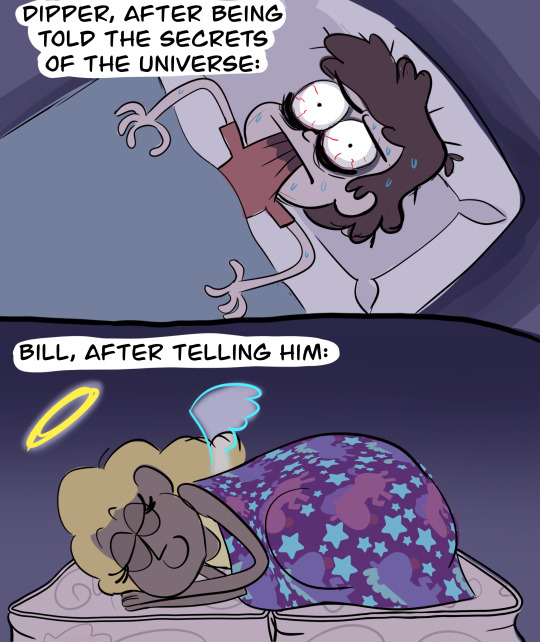
And most importantly... The Eclipse: Prologue.
####
The source of light is a completely hypothetical phenomenon.
Just a couple of centuries ago, scientists postulated that perhaps light was a side-effect of magnetism generated by the poles of planets, and that someday the study of magnets might explain how light shifted over the course of a day.
But modern scientists theorized that light emanated from some force or object in a higher dimension, and that the unseen movements of this source-of-light explained how light ebbed and flowed around the perimeters of objects over the course of a day. Physics experiments backed up this hypothesis of a "third dimensional" origin of light.
Scientists adopted the term "sun" to describe this hypothetical light source. Experiments also suggested the third dimension might have a multitude of weaker light sources that provided much less illumination—perhaps spread across the third dimension like water droplets suspended in fog—which they dubbed "stars."
Roughly once a year, light (or rather, the "sun") was eclipsed. This was a very long time; a child born just after an eclipse might already be in school, have mastered measuring angles and reading, and begun learning multiplication and division by the time they saw their first eclipse. Some years were skipped, such that they wouldn't have an eclipse for two, three, sometimes even four or five years—it was possible to almost reach middle age without seeing an eclipse—with no discernible pattern to these gaps. Eclipses usually occurred around the new year—indeed, New Year's Day was fixed to the average date of the eclipse—but eclipse season ranged up to three months in either direction.
Experiments were being conducted to test ideas about the nature of eclipses—the two most prominent theories were that the sun naturally flickered off and on like a lamp, in a rolling pattern that accounted for how eclipses didn't affect the whole plain simultaneously but had been proven to move; or that the sun was obscured by some object in the third dimension, like a ball thrown in front of a lamp. There were solid arguments in favor of either theory, and thus far the data on hand couldn't disprove either.
But where science petered out, religion took up the baton.
A new religious movement called the Higher Dimensional Gate was picking up steam in the northwest. The cult (as some watchdog organizations called it) had been started a few years ago by a married couple—line and trapezoid—who gave largely inoffensive New Age-flavored sermons about spiritual purity and enlightenment. Their shows would have been unremarkable if not for their inclusion of their child—a charismatic young equilateral triangle they claimed had an "inner eye" that granted him clairvoyance. Every show, they put him on stage for a few minutes, where he'd point out audience members and offer seemingly-psychic insights into their lives. As he approached adolescence, he was given more and more stage time, which he'd use to recite the same sort of rhetoric as his parents while tossing in some novel claims about the third dimension that reflected the public's modern scientific fascinations.
It wasn't until the line's death that they evolved from a traveling psychic sideshow with a few zealous supporters into a burgeoning religious movement. The trapezoid adopted a background role as the precocious triangle took over all their speaking engagements, which he used to spin a novel mythology describing the third dimension as a separate spiritual plane found in an unseeable direction "upward, but not northward" from the mundane mortal plane. It was at this time that they adopted the name Higher Dimensional Gate, and their young leader announced that his spiritual contacts in the third dimension had granted him the title Magister Mentium—teacher of minds (or, perhaps more ominously, master of minds).
Higher Dimensional Gate aggressively recruited new followers, with the Magister leaving school to support a frenetic pace of traveling speaking engagements. More and more devotees followed him from town to town, overfilling hotels wherever they went and flooding parking lots with a caravan of RVs and trailers. Fliers they left in their wake offered mail-order pamphlets, sermon recordings, and religious paraphernalia. But the cult didn't break into the national consciousness until a couple of theoretical astrophysicists published a paper debunking pop culture misinformation on the third dimension.
Along with referencing several sci-fi shows spreading the idea that the third dimension allowed time travel, the authors dove into the bizarre beliefs of several New Age authors, speakers, and religious movements. They particularly maligned the ideas put forth by Higher Dimensional Gate, calling their descriptions of angelic aliens and spirit guides "misleading fairy tales" with no scientific basis in reality. They said the Magister Mentium would have done better to finish a basic public education before making claims about the third dimension.
The paper didn't receive much notice outside popular science magazines—until the Magister Mentium released a vicious public rebuttal that made national news for its absurdity.
Soundbites from his twenty-minute rant were broadcast in news segments about fringe religious movements and scientific literacy. Talk shows played quotes as fodder for jokes. Editorialists predicted that the young triangle was the sort of crooked cult leader who'd be on trial in a decade for cheating his worshipers out of their life savings. Only a few programs played even as much as a full minute from his speech:
"These scientists want you to think that the third dimension is some dead realm hidden behind a door you'll never see—and I'm telling you it's not! It's the dream realm! It's the realm of spirits and positive energy! It stretches into all possible futures, and if you could peer into it, you'd see the road to your own best possible future!
"And I know this. Because unlike these pessimistic brainiacs who mock what they don't understand, I can see the third dimension. I can witness the 'sun' in all its glory—a blazing white circle, more dazzling than anything you've ever seen, so bright it burns like fire to stare at it! I can see it pass through the pinpoint white lights of the 'stars'!
"And I can prove it.
"The most 'educated' minds in the scientific community can't predict an eclipse. They look at their historical records and they do a little math, hope they'll get lucky, and shrug if they're wrong—what do they know? All they can do is guess!
"But with my own all-seeing eye, I've personally witnessed a phenomenon that scientists can't even imagine. I know what passes between the sun and our plane—and I know when it's coming.
"I note all my detractors are in the camp that thinks the sun flickers.
"So let's run a scientific experiment. I challenge the scientific community to predict the next eclipse more accurately than me. I'll give it to you within the minute. In fact—I'll sweeten the deal! I'll give a million dollars to any nerd who can guess more accurately than me! I will personally hand you the prize money!"
"But if you want the prize, you'd better guess soon. Because the eclipse will be here in two weeks. I can already see it on the horizon."
It was nearly seven months until New Year's.
Sources close to the Magister's family claimed he was a spendthrift with nowhere near a million dollars on hand.
When asked to comment on the public ridicule his challenge had inspired, the Magister snidely replied, "We'll see who's laughing after the eclipse."
####
Gideon approached the Mystery Shack disguised in a pair of sunglasses and a camo jacket from his father's closet. The jacket was as long as a dress on him. It was hot.
He kept outside the tree line as he circled the shack, passing the gift shop, the house door, and finally the long side of the house where tourists never parked and the residents rarely ventured.
Gideon peered anxiously at each window for witnesses. He looked up at the attic dormer which once held the window of Bill's face; he caught a flash of bright golden curls pulling out of sight, and flinched. No, that was fine. That was who he was here for. Weren't any other blondes in the house.
When he was sure the coast was clear, he ran across the open ground from the trees to the side door, heart threatening to beat out of his chest. By the time he reached the door, Bill was already downstairs in the floor room, hands and grinning face pressed to the window like a child awaiting a special delivery. He waved excitedly at Gideon.
Gideon hissed, "Shh!" and immediately felt stupid about it.
He partially unzipped his jacket, pulled a manila envelope out of an inner pocket, knelt, and shoved it under the door. As Bill had promised, the door had poor weatherstripping and the envelope slid in easily.
A napkin covered in faint dry marker writing slid out. Gideon picked it up and read it. "Nice work ☆ Boy! I'll pass you the next message at Town Hall. Get yourself something nice, my treat. ◡̈" Inside the napkin's fold was a $5 coupon to the hardware store. It was expired.
Looking at the coupon, Gideon asked himself what a powerless imprisoned demon could really do to help his father's business.
Inside the shack, Bill checked the doorway to ensure no humans were coming for a few minutes, flopped onto the flat old sofa, and pulled several sheets of notebook paper out of the envelope: the answers to all the questions he'd told Gideon to ask his worshiper. He skimmed past her name to the second question: how had they located Bill?
At the sight of a familiar name, his heart leaped into his throat, then slowly sank into its cage again as he read the rest. "Someone calling himself Stanford Pines reached out, claiming to be an ex-cultist wanting to help other victims of the cult. He said the cult's 'founder' was incarcerated. He sounded like an enemy, but they thought he might know something about your disappearance and sent Sue."
Until the last moment, Bill had held onto a sliver of hope. As much as Ford said he couldn't stand Bill, somebody had had to contact his artists, and who else...?
But there it was. It had been Ford; but he hadn't been trying to save Bill. He'd just been trying to rip the nails out of one more thing Bill had built.
Fine. Bill wasn't wasting time on lost causes. He'd never really seen Ford as a friend, anyway. If Ford was stupid enough to throw away a god's favor, that was his loss. Bill could kill him with the rest when he had his power back. He didn't care. He'd just... really thought he could win him back over.
He crumpled up the pages, tossed them on the floor, and hunched forward to rub his eyelid with his hand.
Well, trying to get Ford back on his side had just been a way to pass the time. He hadn't taken it seriously. Not really.
He leaned back, flopped his head on the backrest cushion, and sighed; and then he fished the pages off the floor and smoothed them back out.
He read through the rest of the information Gideon had obtained. His girls in Death Valley had indeed been awaiting his arrival "as Bill requested"; and when he didn't show up on schedule, they'd taken to waiting for him in shifts for half a year before giving up. The way Bill had "requested" was to stack themselves into a human throne for him—he imagined Sue hadn't wanted to mention that detail on the phone with a kid. And they'd kept that up for six months? In shifts? That was hysterical. What a bunch of lunatics. He couldn't wait to meet the gals in person, he was just going to love them. Sue was set up at an inn a few towns west—not a lot of motels in this lonely part of Oregon—and there were a couple more girls in Portland who could be here in an hour.
They'd also made contact with a few devotees of Bill's teachings in Washington, but hadn't told them his exact location. Unsurprising—if they were the devotees he was thinking of, they were less "hardy New Age hippie spiritualists looking forward to the creation of a bright new world" and more "paranoid doomsday preppers anticipating being the last survivors of the doomed old world." The Death Valley group probably didn't trust them. Just about all of Bill's "students" were freaks of one sort or another—if not when he met them, then by the time he was done with them—but different varieties of freaks usually clashed. He had to keep them safely corralled into separate sects to maintain the harmony and their loyalty.
They were all so, so close—all these humans just waiting for an opportunity to meet him, touch him, save him, serve him, love him. They were so close he could almost reach out and grab them.
But "almost" wouldn't get them into his hands.
Something would come up soon. He was sure. He could feel it.
####
Sometimes, stairs just weren't worth the effort.
Bill understood, intellectually, that stair steps had a "top" surface and a "side" surface. He also understood that, given how gravity worked in this dimension, you could only step on their top surfaces. He knew this. He was smart. He'd personally worked out the equations to calculate how gravity worked in this dimension ages before an apple beaned Newton.
It was just that, when he looked at a staircase, he couldn't shake the impression that someone had simply taken a 2D plane and artistically folded it into a zigzag. And on a folded 2D plane, there wasn't a "top" surface and a "side" surface; there was just the surface, and a 3D body could stand anywhere atop the surface with no problem.
So he would try to get from the attic to the kitchen, subconsciously decide that rather than walking "down" the stairs standing vertically he wanted to walk "up" the stairs standing horizontally, and he'd try to lean forward to put his foot on the side of a step—and then his face was on the floor again.
And even when he kept his ups up and his sides sideways, sometimes over-concentrating on where to step distracted him into tripping anyway.
The stairs in the Quadrangle of Qonfusion never gave him trouble. They worked fine both vertically and horizontally, he'd designed them that way. And also he didn't need to use them. He could float. They were mainly there for the outerplanar Henchmaniacs and because Bill liked the zigzag motif. He was much less fond of stairs these days. When he got home, he was ripping them all out and replacing them with ladders and slides.
He was better with stairs than he'd been when he first occupied this body. But when he didn't focus on every single step, he still tended to slip up. He often got to the stairs and saw his body crumpled on the landing fifteen seconds in the future. If the damage wasn't too severe, sometimes he just resigned himself to the bruises and stepped off the ledge. Had to get downstairs somehow, after all.
But sometimes the future held a broken leg, or an unconscious heap, or a lot of blood. When that happened, sometimes he'd shuffle his footing a bit until the future looked less painful and then try descending. Sometimes he'd creep down to the last safe step and then look for a less fatal route the rest of the way down.
And sometimes he got halfway down the stairs, saw looming disaster, couldn't for the life of him figure out how to avoid it, and thought forget it and just sat down in the middle of the staircase. If he waited there long enough, eventually whatever he'd been about to instinctively do would change, and he could safely finish his journey.
Stairs were, by far, the most frequent and most stupid of his inconveniences as a human.
He never thought to bring something to read in case he hit unexpected delays on the stairs. There was nothing interesting to do, and he didn't so much as have a window to look out of. He got bored. He was constantly sleep-deprived. Sometimes he fell asleep, leaning against the wall.
He'd overheard the humans speculating on why he liked to nap on the stairs. The leading theory was that it had been normal in his home dimension, followed closely by runner-up theory "just to annoy us." None had asked him directly. They usually just left him alone on the stairs. But not today.
Bill flinched out of sleep as his leg was kicked. A fizzling field of white pinpricks filled his vision and faded as he opened his eyes. "Mruh?"
"You're blocking the stairs," Dipper said. This time Bill had fallen asleep on the stairs below the landing, slouched down with his shoulders and head against the wall, legs stretched across two stair steps and knees raised.
"And you're disturbing my sleep." Bill yawned and glanced downstairs. Coast was clear. He could get to the living room with nothing but a fumble on the next to bottom step now.
"Get out of the way." Dipper kicked his leg again.
Well, now Bill didn't want to get up. He kicked Dipper back. "No. Your ancestors lived in trees, act like it."
"What?"
"Climb, monkey boy."
Dipper grumbled, but surveyed his roadblock thoughtfully. He experimentally lifted a foot over Bill's abdomen, considered how far down it was to the next step, and scooted down to Bill's feet instead. Bill watched with a smirk as Dipper clung to the railing and gingerly stepped over one foot to the edge of the stair step, and then the next. Bill briefly considered tripping him, decided it wasn't worth getting in trouble, and instead twitched a foot up as Dipper passed over and laughed when he jumped.
"Jerk," Dipper muttered. "This is why you only have one friend."
The jab ripped at a raw sore in his chest. Ex-cultist. "Whatever!" He laughed loudly. "My real friends are all one little interdimensional rift away, I didn't come here to make pals with humans." He jerked his hood down over his eyes and slouched lower, arms crossed tight. "I don't even care. This entire universe is a hologram and nothing's real anyway."
There was silence. Bill congratulated himself on getting the last word in; and then Dipper said, "What does that mean?"
"What kind of stupid—it means I don't care about you, what do you think it means? You're made from the exhaust belched out of a star's tailpipe—"
"I meant, the hologram thing. You're always saying stuff about the universe not being real, what are you talking about."
Bill thumbed the hem of his hood up and glanced down at Dipper. He was standing at the bottom of the stairs, looking up determinedly. He'd pulled out his journal and pen. He was serious. He was all ready to learn about the secrets of the universe.
Ford's little wanna-be protégé with his little knock-off Journal, wasn't he adorable. He wanted so much to be just like his great uncle. And in many ways, he was like a younger Ford. The ignorant, arrogant, insecure, naïve, easily-flattered, easily-exploited younger Ford, back before he grew a personality. Except even back at his most boring, Ford had found the strange beautiful where this kid only found it interesting. You don't have what it takes to be Ford.
Bill was already filling this brat's head with gunk—bogus conspiracy theories, wild goose chases after lucid dreaming, nightmares about whole dimensions that existed only as parables for somebody else. What was a little bit more? He could give this kid something to talk to his therapist about. Something that—in his darkest, lowest, loneliest moments—would come back to mind, and remind him that nothing he did would ever matter.
Plus, he hoped Ford would look in on the living room and seethe about not being his student anymore.
"All right kid, sure! Fine. You just so happened to catch me on a day when I've got nothing to do." Bill stood, stretched, and sauntered down the stairs. He fumbled on the next to bottom step. "You wanna know about the universe? You wanna know the big secret?"
"Uh..." Dipper eagerly flipped through his journal, looking for a blank page. Apparently he hadn't expected Bill to actually indulge his curiosity. "'Secret'?" He trailed after Bill into the living room.
"Okay, okay, maybe it's not a 'secret'—a secret suggests somebody's trying to hide it. It's just that nobody thinks you're important enough to tell and you're too primitive to see it for yourself."
Bill turned around, a lecturer on a stage. Dipper sat on the couch and tried to position his journal on his knees to take notes. He looked so attentive. He thought he was going to enjoy this.
"So you remember what I told you about the second dimension. That from the third dimension's perspective, it's nothing but shadows cast on a wall."
"Plato's cave. Yeah."
"Your dimension is a lot like that. There are higher dimensions than this, and your entire universe is being projected down from one of them. If being in the second dimension and seeing into the third is like being a shadow looking at the entrance to the cave, then being in the third and seeing into the fourth is like a character on a movie screen looking out at the film projector. While you're distracted by the movie, I'm studying the film reel and watching the frames coming up. It's how I tell the future—and you can't even tell yourself I'm lying about that, because you've seen me do it."
Dipper grumbled, "You've spoiled the killer on Duck-tective."
"I've spoiled the killer on Duck-tective! Twice!"
Dipper was furiously taking notes. "Wait—so, the fourth dimension really is time? Mabel and I kinda visited the fourth dimension once, but I wasn't sure if it being 'time' was, like, some kind of metaphor..."
"Ha! Listen to you! That's like asking if the third dimension is light. No. Time isn't the fourth dimension. It's just in the fourth dimension," Bill said. "And for the record you didn't really visit the fourth dimension. The glowing blue tunnel with floating clocks and calendars? That was a metaphor."
"Aw man," Dipper muttered, disappointed.
"So when you say you can see the future, you mean—you literally see it? With your eyeballs?"
"All-seeing eye," Bill said smugly.
"Can... you teach me?"
"No. It's not a learnable skill. You're either born with an inner—what's the human phrase?—a third eye, or you aren't."
Dipper processed that. "How do I find out if I have—?"
"You don't."
"Aw."
Bill waited for Dipper to scribble down a couple more lines before he casually dropped the next bombshell: "In fact, not only have you never been 'in' the fourth dimension—your universe isn't really even third dimensional."
Dipper's pen gouged into the page. "What do you mean, it's not third dimensional!"
"I mean you've got two dimensions and the third's an illusion. Hologram, remember?"
"What are you—" Dipper waved a hand around in the air. "I'm moving my arm through the third dimension right now!"
"No you're not."
Dipper threw his pen on the ground. "Okay, you're messing with me!"
"Not this time. Listen. Got a little riddle for you: what do Plato's cave and a movie theater have in common?"
Dipper pursed his lips angrily, but he'd been issued a riddle and couldn't resist trying to solve it. "Sitting in the dark, staring at shapes?"
"Ha! Look at it, it still thinks it's part of the audience!" Bill wagged a finger disapprovingly. "In both cases, everyone and everything in the show is an illusion—just light and shadows projected on a flat wall."
"But—! The world would look flat if it was 2D—"
"It does look flat. 2D is all you've ever seen," Bill said. He held his hands out, thumbs and forefingers forming a rectangle like a picture frame, his exposed eye staring through it at Dipper. "Your eyes only see a pair of two-dimensional images that your brain interprets as 3D because it's been trained to. Depth perception is an optical illusion! You can't actually witness the depth of an object—your brain uses context clues to guess it! And the context clues are lying to you."
Dipper scowled. "But." He paused. "It's different."
"Uh-huh." Bill leaned against a wall, feigning a yawn. "Okay, wow me with your philosophy."
"Pictures on paper are 2D, and they don't look 3D, so since the real world does look 3D..."
"Hey, you know that autostereogram art your sister's friend likes so much? Magic Vision Posters?" Bill asked. "Cross your eyes a little and a 3D illusion pops out of the page?"
Dipper's frown deepened.
Bill's smile widened. "And those are just manmade pictures. The projectors I'm talking about are cosmically complex. If it's so easy to trick your brain into seeing something three dimensional in a flat image, then how do you know, really know, that everything around you is 3D rather than an infinitely complex 2D hologram?"
"Be... cause..." Dipper looked around, grasping for another defense of reality as he knew it. He picked his pen off the floor. "Because I can touch an object and feel it's 3D! Even if my eyes can be fooled, I can... look, I can feel the curve of the barrel and everything."
"And?" Bill asked. "If your laundry comes out of the dryer unexpectedly cool, you think it's damp because your species didn't evolve wetness-sensing nerves. And you still trust your sense of touch?"
"Wait, that's why that happens?"
"Uh-huh. Water is wet, your t-shirts aren't, and your third dimension's an optical illusion."
Dipper slouched back on the couch, arms crossed, chewing his pen, brows drawn and eyes unfocused. Bill watched with a smirk as Dipper's faith in an objective observable reality slowly eroded before his very eye. For someone so eager to burrow into the strange, Dipper wanted so much for the world to make sense. That was why he was burrowing into the strange in the first place: to shine a flashlight on the things that go bump in the dark.
Maybe that was what rubbed Bill so wrong about this kid. Bill was sure that, deep in his heart, Dipper didn't really know how to celebrate the weird; he only wanted to expand the boundaries of normal. Disgusting.
Finally, Dipper mumbled, "How did you find this out?"
"This little shadow peeled itself off the wall and flew out of the cave—do you think I stopped there? I've seen further! What looks like an inescapable labyrinth to a two-dimensional Minotaur is nothing but a fun maze in a puzzle book when you can see over the walls from the third dimension's perspective. And once you can see the fourth dimension, your so-called 'third' dimension looks no different! I can see through walls, into boxes, past barriers; and I can see just how flat your world really is. Like taking a photo and looking at it from the edge."
"Hm." Dipper was still staring into space.
Bill's smug smile drooped into a frown. Dipper didn't look like he'd absorbed anything Bill just said. He hated an inattentive audience.
He crossed the room, planting a hand on the couch backrest by Dipper's head to lean over him, and waited until Dipper looked up into his eye. Bill said, "And I can tell you, beyond a shadow of a doubt: you're no more real to the things projecting your universe than the shadows in Plato's cave are to you. This. Entire. Universe. Doesn't. Exist. And nothing that happens here matters."
That little look of doubt edging into dread was so, so satisfying.
Bill pushed himself upright and sauntered to the door, his hex cast, ready to leave Dipper alone with his budding existential crisis. "So that's why I try to have fun with it! Your whole dimension is like an amusement park. Why hang out in a cave unless you're leaving cave paintings, who cares what the shadows think about the graffiti?"
"What's in those higher dimensions?"
Bill paused, glancing over his shoulder. "'Scuse me?"
"Something's gotta be running the 'projector' or whatever, right?" He asked it with an edge of desperation, like if Dipper could just make it that far, the world would make sense again. "Movies have audiences. Who're they?"
Bill stared at Dipper—and then slowly grinned again. What a glutton for misery. Feed him a bitter spoonful of poisonous knowledge and he asks for the bowl. But of course—tell him that reality isn't real and the next thing he wants to know is where to find reality.
Okay, fine, Bill would keep playing—this was almost fun. "Higher dimensional beings! Duh."
"What are they like?"
"Wretched incomprehensible shapeshifting contortions of flesh and bone that appear to gorily mutate as their vast bodies pass through the dimensions your limited eyes are capable of viewing. Seeing them will drive you mad."
"Ah. Great," Dipper said. "But what are they like as people?"
"From your perspective, all-knowing and unknowable. Talking to them will also drive you mad."
"I'm detecting a theme here," Dipper grumbled.
Bill gave him a polite golf clap. "Another win for human pattern-detection instincts! Give 'im a hand." (Oh, Bill wished he had his powers. It would be so funny to give Dipper a giant disembodied hand.)
In spite of his visible irritation, Dipper was still taking notes. "Is it possible for a human to meet one?"
"You've got more pattern-detection instincts than self-preservation instincts," Bill said wryly. "But sure, of course it's possible. In fact, I think you already met one."
That got him looking up from his journal. "I did?"
"Sure! Not here, but in a parallel universe that doesn't exist anymore. No clue what you talked about, I steer away from that guy when I can. But hey, maybe you'll remember it someday."
"How can I remember it if it happened to a parallel me in another universe?"
"When things like him speak, they leave vast echoes. Even across timelines."
Dipper considered that. "Could I meet him again?"
"Maybe if he takes an interest in you. Pray he doesn't. Prayers won't actually help, but it's something to keep your mind occupied!"
"Is it possible to be more proactive about meeting one of them?"
Bill laughed. "Kid, you're stupid. And that makes you very entertaining."
"Great?"
"But if you wanna break into some cosmic horror's living room, sure! If they don't come down here, all you need to do is go up there."
And back to taking notes Dipper went. "You gonna elaborate, orrr..."
"Ha, fine. The issue is you're not built for higher dimensions. Like I said, you might seem real to yourself here, but there you'd just be a light on a wall." He made a circle between his forefinger and thumb, turned his hand upside down, and peered through the circle like a monocle. "If you want to ascend, you need an aperture to translate between dimensions—something through which fourth-dimensional spacetime can be compacted enough to appear three-dimensional, or pseudo three-dimensional spacetime can be augmented with a fourth dimension. With an aperture like that, you can climb up and down the dimensional ladder to visit anywhere level of reality you want—from the zeroth dimension to the billionth."
"Including wherever our universe's projector is?"
"Bingo. Unfortunately for your suicidal ambitions, inventing an aperture capable of manipulating spacetime like that needs a lot of science humanity is nowhere near mastering; but with the materials humanity currently knows how to manufacture, I bet building one would be pretty simple if you got instructions from a species that's already done it." Bill arched his brows mockingly. "Hey, might even make a fun little summer project, if you don't mind going insane. Something to take to the science fair next year, huh?"
"Shut up," Dipper said. "And—if you got out of your dimension—do you know about species that can give those instructions?"
"Suuure! Heck, give me a couple pieces of paper and a pen and I could probably whip up the blueprints myself."
Dipper nodded. Dipper processed that. Dipper glared at Bill. "Wait a minute. Are you trying to get me to build another portal for you?!"
Bill cackled, doubling over. Voice shrill, he said, "I was wondering how long it'd take you!"
"Oh my god."
He groped for an arm chair and dropped down, still laughing. "I was this close to saying 'why don't you ask your uncle for the blueprints' to see if you'd get it!" He wheezed, "Can you imagine the look on his face!"
Dipper chucked his pen at Bill. "I hate you."
"Hook, line, and sinker! You idiot!" He slid halfway out of his seat, covering his face with his hands.
Dipper groaned. "So you made up all that stuff about the third dimension being fake and the universe being a hologram?"
Bill struggled to control his laughter enough to catch his breath. "No—no, all that was true. A hundred percent scientifically verifiable!"
"Shut up, man." Dipper got off the couch, kicked the back of Bill's armchair as he passed, and trudged into the gift shop.
####
"Hey Grunkle Ford? Is the third dimension actually an illusion being projected out of the fourth?"
"Been talking to Bill again, have you?"
Dipper winced. "I mean. Well. But he's not telling the truth, is he?"
"Mmm..." Ford waggled a hand uncertainly.
"What."
"Based on our current knowledge of quantum mechanics, it's not impossible," Ford admitted. "And it would explain some things about black holes."
"Ugh. That's the worst thing I've ever heard." Dipper rubbed his eyes. "How do you live with that?"
"With what?"
"Thinking the entire universe might be, just... some kind of projection? Like a movie?" Dipper said. "I mean... what's the point of doing anything if everything's fake. That's awful."
Ford pressed his lips together.
####
1981
"The universe is what?" Ford asked.
His muse shrugged apologetically. "Sorry to break it to ya, kid! I figured you'd rather hear it from me than—"
"But—but that's amazing!" Ford started pacing across the dreamscape's translucent grid floor. "The implications for physics, for faster-than-light travel, for, for—for religion?" He looked at Bill. "Is the projection a natural phenomenon or someone's creation."
"Uh," Bill said. "Creation?"
"Then who made it? Descartes' 'evil genius'? A demiurge? God?"
Bill laughed. "Kid, depending on your interdimensional political opinions, those are three names for the same guy."
"He's real?"
"Define 'real'," Bill said. "And 'he.' And 'is.'"
"I... I cannot do that!" Ford resumed pacing, muttering again about the implications.
Eye crinkled in amusement, Bill said, "I've gotta say, Stanford, you're taking this pretty well. Most humans don't like hearing they're secretly flat."
Ford barked a laugh. "'Most humans' didn't like hearing that the Earth isn't the center of the solar system. I'm a man of science! If we could prove this, it would be the biggest leap forward in physics since special relativity!" He beamed at Bill. "Do you realize what this means?"
Bill pointed at their portal calculations. "It means if you want to get this working, you need to zero out all the depth values."
"Ah." Ford's shoulders sagged. "Yes. That too."
"Wish you'd taken that fourth semester of Fifth-Dimensional Calculus now?"
"Hush," Ford said sourly, and was immediately mortified at himself for being so disrespectful to his muse; but Bill laughed with what sounded like genuine delight.
####
2013
"Right," Ford said self-consciously. "Awful."
####
At three a.m., Dipper lay in bed, gnawing at his shirt collar, staring at the ceiling.
Yeah. Oh yeah. He could feel it. Wondering whether reality was real would haunt him the rest of his life.
####
Bill slept like a baby.
Nothing like bullying a child to improve a miserable day.
####
Bill woke the next morning from a nightmare about—what had it been about. Being trapped in the bathroom as a metaphor for... something or other. Being trapped in general, probably. Great, had that incident given him trauma? Was he gonna start having recurring nightmares? Would this be a thing he had to deal with? What a miserable malfunctioning species humans were.
He could see the beforeimage of Mabel coming upstairs; not enough time to pull out his dream diary. He'd just have to remember it to write down later. He sat up, cracked his sore neck, and shuffled to the stairs in search of breakfast.
His foot missed the first step and landed on empty air, his stomach lurched, and he braced for a rough landing. In the split second he hung in the air, he thought that he wasn't supposed to fall, he'd looked. Hadn't he looked? He was sure he had—he didn't remember looking, but he could always see, if there'd been an injury in his imminent future he would have subconsciously noticed it and stopped to evaluate, the fact that he'd just walked meant there was nothing for him to notice—right? Idiot, why hadn't he double checked before he just walked off half-asleep—
It occurred to him that this split second was lasting a lot longer than it was supposed to.
He caught the handrail. His fall stopped as he gently bumped into the wall.
"Huh." He straightened up, gave the stairs a puzzled look; and then, experimentally, did a little hop. He went higher than he'd meant to, and hung in the air longer than he should have. He repeated the experiment a couple of times; and then, took a bigger jump forward, aiming for a couple of steps down. He seemed to float in the air for a moment before his feet gently settled on the wooden board. "Oo-oo-ooh." He looked around the stairwell, baffled; and then he looked up, eye burning as he stared through the roof and into the sky.
A chill ran up his spine. "Uh-oh."
####
Dipper frowned at his syrup bottle as the syrup painstakingly oozed out. When he let up his squeezing even a little bit, the syrup sucked back in.
"Come on." He squeezed again and shook the bottle over his pancakes. Like morning dew on the fruits hanging above the head of Tantalus, a round drop of syrup glistened under the skin-softening kitchen light, but never fell. "What's the problem?" Dipper wiped the drop onto his finger and wiped his finger on his pancakes.
Mabel slammed the door open and pounded into the kitchen. "Dipper! Come outside, I need to show you something!" They ran out.
Mabel stood on the edge of the porch, held up an orange glitter-filled super bounce ball the size of a walnut, and said, "Watch this!" She flung the ball down on the porch step as hard as she could.
It rocketed up into the sky, arcing away from the Mystery Shack toward the forest. Dipper's jaw dropped. "Whoa!"
"I just lost four balls that way!" Mabel planted her hands on her hips, watching with satisfaction as the pinprick point of the latest ball soared upward until it disappointed. "I'm gonna get some more!" She ran inside and bolted up the stairs.
Ford passed from the gift shop into the living room, frowning. He picked up a magazine left on the dinosaur skull, flipped through it, and observed how slowly the pages fluttered. "Hmm."
From the entryway, he could hear Stan down the hall on the office phone: "Hello? Doctor? This is Stan Pines. Yeah, I got a medical question. I stepped on the scale this morning, and it says I lost twenty percent of my weight overnight. Do I have cancer?" There was a pause. "Eighth call this morning?! What is this, some kinda bug going around town?"
Dipper closed the door as he came back inside. "Hey, Grunkle Ford? I think there's something..."
"Something strange going on? Yes, I've noticed," he said. "It seems that gravity is about twenty percent lower than usual." He pulled his sparkly birthday pen out of his coat pocket and dropped it from several feet up into his other hand. It fell just a bit slower than normal—not enough that it looked like it was on the moon, but enough that the motion looked uncanny.
"What's going on?"
"I don't..." Ford trailed off as a flash of bright yellow appeared in his peripheral vision. He turned toward the stairs.
Bill had stepped onto the landing. He looked at the bottom half of the staircase with a critical, calculating gaze; and then jumped off the top step. In a single smooth, slow arc, he leaped over all the stairs and descended, slow as a feather, to land lightly on the floor.
"Whoa." Under his breath, Dipper said, "That's a lot more than twenty percent lower."
It just figured he had something to do with this. "Bill," Ford snapped. "What's going on?"
He wasn't expecting Bill to give him such a solemn look.
"There's an eclipse coming," Bill said. "I'd give it three days."
####
(Be honest how long did it take you to figure out Bill was just seeing if he could get Dipper hyped about building a portal. Anyway, hope you enjoyed!! We're heading into the biggest storyline so far—plotwise, lengthwise, and emotionwise—so I'd love to hear what you're thinking and expecting so far!)
#bill cipher#human bill cipher#dipper pines#gravity falls#gravity falls fic#gravity falls fanart#fanart#my art#my writing#bill goldilocks cipher
511 notes
·
View notes
Note
So amid all of the pairing discourse being sent to this blog, one little thing stuck out to me. Someone commented claiming that AkuRoku is one of the most popular pairings on AO3 with some of the largest numbers of fics, but being the statistics nerd I am, and knowing the general trajectory of this fanbase, I decided to run some numbers and put that claim to the test.
(Actually, looking into that got me really curious about the general popularity over time of all the relatively notable pairings in KH, so I think I might eventually make a formal post compiling all my findings once I have a little more time. This is definitely informal, but it’s just an initial impression of my research thus far. Obviously, take this with a grain of salt: fanfic is only one piece of the general popularity puzzle, but it does seem to be generally understood as a decent benchmark for analysis of broader trends within fandoms.)
As a note, I measured fic numbers by date of update from April to April, year to year on AO3, so factors like game release date timing should be taken into account.
To absolutely no one’s surprise, SoRiku is the undisputed king of KH shipping. It’s been going incredibly strong since 02 but even then experienced a massive jump at KH3’s release, number of fics updated in the year multiplying nearly 6x in 2019 from where it had been in 2017. It’s slowly settled down since, but is still holding at well over 300 fics per year, even during this content drought. It’s vastly above everything else in popularity and always has been.
Most pairings have followed a similar pattern since KH3’s release: The entire fandom experienced a general jump in activity and most pairings got a boost from 2018-2020, although some more dramatically than others: Akusai fics (inclusive of fics tagged just leaisa, just akusai, or both, not counting the same fics twice) experienced a more dramatic leap than any other pairing in 2019, going from just 40 in 2017, to 183 the following year, to 350 in 2019–an 8x jump in interest. (Wow!)
Like Soriku, most other pairings have generally gone fallow since 2020, as that was the last time we all got any sort of content. (Missing Link when Nomura.)
As far as the stats for Akuroku go… Honestly a bit gobsmacked by the trends in the data. I decided to include both number of fics updated per year on both AO3 and fanfiction.net, as the fandom’s early 2000s heyday can’t really be accounted for on AO3. fanfiction.net’s numbers are a little inflated because I couldn’t honestly be bothered to separate out the infinitesimally small number of non-ship fics in the 2000s and early 2010s from the overwhelmingly large proportion of ship fics there, but if you compare how many fics that pairing used to get in its heyday from 2006-2011, it used to average out at roughly 1000 fics a year.
From 2012 on, the drop in popularity is precipitous—on both fanfiction.net and AO3. it had less than half the fics in 2012 on fanfiction.net than it did in 2010, and it’s continued to exponentially decline there since. For example, there were no AkuRoku ships updated on fanfiction.net last year, and there were only 2 updated the year before. (Noting that fandoms at large did begin to increasingly migrate away from fanfiction.net after 2012, which also explains similar but less extreme declines in otherwise healthy ships like SoRiku on that website).
It fares a little better on AO3, although it’s been eclipsed in popularity by ships that were once drastically less popular than it involving the same characters at several points—Leaisa/Akusai for example consistently had hundreds more fics than it from around 2018-2020, an impressive feat considering that ship basically didn’t exist prior to 2013~2014, although it’s gone quieter since.
AkuRoku has remained pretty much consistent at roughly 150~200 fics per year on AO3 since 2012 (a couple years have had roughly a 10~20 variance above or below that, no significant jumps either way, though it did roughly halve from a high year in 2020 to a low year in 2021) which leads me to believe that it’s… probably more off in its own world separate from what the rest of the fandom is doing than other ship communities? It doesn’t follow the same trends as ships that are more closely following the story developments in canon do.
It’s kind of surprising to see it be that much of a general drop, though. I knew it was less popular than it once was, but I didn’t realize just how much less popular it really is. 150~200 fics updated a year sounds like a lot, but if you compare it to how absurdly ubiquitous it used to be, it’s a shadow of its former self. Unless KH4 has a bunch of interactions with them and them alone, going by the trends and general attitude of the fandom, I think it’ll probably just continue to slowly lose momentum. It still has a lot of diehards, but it would appear that the majority compared to that of 15-20 years ago have jumped ship, so to speak. I have a feeling that if Roxas ever gains any significant peer relationships with different male characters in the future, it’ll likely be another nail in the coffin for it as enthusiasm for a gay Roxas ship bleeds elsewhere.
So, uh, basically… everyone who’s freaking out about it, chill? It’s probably just going to continue slowly petering out on its own eventually as the next games move away from the characterization that initially made it popular, whether anyone wants it to or not. That’s what fic trends would appear to indicate, at any rate.
Side note: out of all the pairings I’ve analyzed popularity over time for thus far, I’m surprisingly impressed by Naminé/Xion. I thought it was way more of a rarepair than it actually is. It’s not going anywhere crazy like Soriku, but it’s actually rather consistent with other moderately popular kid pairs like Roxas/Xion on AO3, and saw a jump in numbers above Roxas/Naminé of all things from 2019-2020, which I would never have anticipated. Let’s go lesbians! I guess KH3 really did change things up.
~~~
#confession of the heart#kh#kingdom hearts#anon i applaud you for running these numbers thank you for this. this was a fascinating read
59 notes
·
View notes
Text
Although far from the most heinous of villains, there’s one Avatar: the Last Airbender character whom I still harbor a very generous amount of hatred for:

King Kuei, aka the ruler of Ba Sing Se, aka the Earth King who somehow managed not to know his kingdom had been under siege by a foreign power for over a century.
And I know most people, the narrative included, forgive him for his ignorance due to the fact it was Long Feng’s conspiracy that made it so. But for a man in King Kuei’s position, I think the ignorance is a cruelty and abuse of power, even if not at the same level as Long Feng, the Dai Li and their conspiracy.
Because in order for Kuei not to know about the war, he had to not knos about anything that was happening in his kingdom. To not know about the war, he also had to not know about the refugees pouring into his kingdom. He had to therefore be clueless about things like housing, food, water, citizenship/immigration, foreign policy, and trade. He had to not know anything about the general standard of living of his people, in addition to their safety — and we see that in action when Team Avatar takes him outside the palace!
And MAYBE Kuei was just tricked by faked documents, if you really wanna give him the benefit of the doubt — maybe he just read the summary reports saying all was well and believed them, or made whatever allocations his advisors suggested without looking at the data personally or confirming through a secondary source. But Long Feng made it sound more like the king just runs museums and cultural preservation programs and delegates all the rest. Which just circles back to him not looking closely enough at what’s happening to actually see it! That is not good leadership.
And if you wanna talk about what Kuei does after he learns the truth about his loyal advisor and tries to take charge himself…uh.
He immediately spills the invasion plan and all its details to Azula, which led to the eclipse invasion failing. (Yes, she was disguised as an allied warrior, but she was still a total stranger and a random teenager from an arguably foreign island. A good leader wouldn’t have told her everything he did, even with good reason to think her trustworthy. And sure, Azula might’ve learned of the invasion regardless, but Kuei definitely made the situation worse.)
Kuei does nothing to help with the modified solar eclipse invasion, either — he tells Team Avatar to do what they want and fucks off to travel the world with his pet for a few months. Maybe acceptable behavior from an influencer, but not from a king whose country has been invaded and colonized by a hostile, genocidal nation. Kuei completely abandoned his people during their worst hour, which he helped bring about! Instead of trying to make up for his failure, he shrugs it off and moves on, then comes back and retakes his throne once someone else has done all the work of getting rid of those pesky invaders.
Kuei doesn’t show up when the White Lotus retakes Ba Sing Se — he doesn’t even know it’s happening, which speaks to his apathy towards the well-being of his people. The invaders are finally being kicked out, the war is about to end, and King Kuei has no idea. If word hadn’t reached him after the war ended, would someone else have been installed as king? Frankly, I think it might’ve been for the best, had they not needed to make it seem like the Earth Kingdom was going back to normal.
Like, at the end of the day, Jeong-Jeong, Piandao, and Iroh — all three Fire Nation deserters, and one a former enemy general who once pillaged the city and a BROTHER OF THE CURRENT FIRE LORD — did more to help Ba Sing Se than its king. And you can’t even blame the White Lotus for not making an effort to find and include Kuei, because he would’ve just been dead weight for them. He wouldn’t actually know enough about the infrastructure to be an asset, and it’s not like his face is known by the people enough for him to grant morale to local earthbenders. For all its tragic Kuei had no clue his city was being reclaimed, he would’ve been unable to do anything if he knew. Because Iroh knew more about Kuei’s city than he did!
And then in the comics, once he’s back on the throne he immediately almost restarts the war. The HUNDRED YEAR WAR that ended like a MONTH ago. Because Zuko says “hey actually these Fire Nation colonies existed for almost a century, it’ll be hard to tear them apart without hurting a ton of people and splitting up families. let them stay while we sort things out.” Kuei then goes to war (he mobilized his army and everything) because Zuko the teenage Firelord does one (1) mean and slightly concerning thing that.
(I will freely admit: Zuko was also at fault, he did not handle that situation well by any means. And even if his conclusions were reasonable, he sure expressed them in a way that would made the nation they just stopped targeting the Earth Kingdom in war very tetchy. But Kuei doesn’t know enough about the war or Zuko or his own kingdom to actually know why this is bad! It’s not a trauma response nor fear for the well-being of his people, but a desire to prove his own worth that motivates Kuei to send armed forces to remove the Fire Nation colonies. He’s certainly not absolved for how fast he pulled the trigger and wanted to resume war, just to feel like he was doing something.)
Zuko’s bad choices were rooted in concern for his people and having visited the colonies himself and seen how difficult the situation was. Kuei just wanted to appease his ego by feeling strong and decisive even when it meant making an uninformed decision. “Well I was useless before so I gotta make sure I take swift actions now, even if that means being uninformed and using liberal violence. Soldiers move out!”
WHY DID HE HAVE TO GO BACK ON THE THRONE. CAN’T BUMI OR TOPH TAKE OVER RULING BA SING SE???
The fact most of Kuei’s sins are born of ignorance doesn’t absolve him, because a person in his position should never be ignorant to that extent. And Kuei knows it — that’s why he’s defensive, but also ashamed, when Team Avatar proves the existence of the war to him. Kuei has all the resources and tools to educate himself. He just…chooses not to.
The fact he makes one good decision when he trusts team Avatar over Long Feng ALSO falls short when you remember how long it took them to get there and how little that actually achieved. He goes right back to ignoring them after the war once they stop telling him what he wants to hear, anyway!
(Plus, if they’d NOT gone to him for help, the Invasion on the Day of Black Sun might have succeeded. The water tribe soldiers, mechanists, and earthbenders not from Ba Sing Se were the forces they actually ended up with — they didn’t need Kuei’s armies to get as far as the palace! — and they could’ve won if they’d had the element of surprise.)
Anyway. Kuei was useless and given his position, had no right to be. What happened to even noblesse oblige? All those privileges he earned from the labor of his people, and he couldn’t actually be bothered to know a damn thing about their lives. Much less protect them.
So yeah. King Kuei hate mail time.
For some reason extra incompetent people inserting themselves into political offices and then ignoring the well-being of their country makes me extra mad lately.
#avatar the last airbender#atla#king kuei#atla kuei#atla earth king#atla analysis#atla comics#max.txt
143 notes
·
View notes
Text

Best of Steam 2024
In Top Sellers ("The Year's Top Games measured by Gross Revenue"), Dragon Age: The Veilguard made the Bronze category
In New Releases ("The Year's Top New Releases measured by Gross Revenue"), it made Gold
In Most Played ("The Year's Most Played Games measured by Peak Concurrent Players"), it made Bronze ("Over 50,000 Peak Players")

Some more details on these categories:

"Notes Revenue specifics are not disclosed for the games on each list, so we group them together into buckets. The games within each bucket are randomly sorted: Platinum: 1st - 12th Gold: 13th - 24th Silver: 25th - 50th Bronze: 51st - 100th When generating each of these lists, we looked at data from January 1st, 2024 through December 15th, 2024. Top Sellers These are the best-selling games on Steam based on total gross revenue earned in 2024. New Releases These are the best-selling releases of 2024. This list is created by looking at every game released in 2024, then selecting the top ones based on their first two weeks of revenue after releasing. Each month's respective Top Releases can be found on the Charts Hub homepage. Most Played These are the most-played games of 2024, showcasing the games that eclipsed 50,000 peak players during 2024. Games are grouped by the number of peak concurrent player counts that they reached during the year. We've excluded player counts attributable to things like giveaways and free weekends.
[source, via]
#dragon age: the veilguard#dragon age: dreadwolf#dragon age 4#the dread wolf rises#da4#dragon age#bioware#video games#long post#longpost
40 notes
·
View notes
Text
Hypothetical Decentralised Social Media Protocol Stack
if we were to dream up the Next Social Media from first principles we face three problems. one is scaling hosting, the second is discovery/aggregation, the third is moderation.
hosting
hosting for millions of users is very very expensive. you have to have a network of datacentres around the world and mechanisms to sync the data between them. you probably use something like AWS, and they will charge you an eye-watering amount of money for it. since it's so expensive, there's no way to break even except by either charging users to access your service (which people generally hate to do) or selling ads, the ability to intrude on their attention to the highest bidder (which people also hate, and go out of their way to filter out). unless you have a lot of money to burn, this is a major barrier.
the traditional internet hosts everything on different servers, and you use addresses that point you to that server. the problem with this is that it responds poorly to sudden spikes in attention. if you self-host your blog, you can get DDOSed entirely by accident. you can use a service like cloudflare to protect you but that's $$$. you can host a blog on a service like wordpress, or a static site on a service like Github Pages or Neocities, often for free, but that broadly limits interaction to people leaving comments on your blog and doesn't have the off-the-cuff passing-thought sort of interaction that social media does.
the middle ground is forums, which used to be the primary form of social interaction before social media eclipsed them, typically running on one or a few servers with a database + frontend. these are viable enough, often they can be run with fairly minimal ads or by user subscriptions (the SomethingAwful model), but they can't scale indefinitely, and each one is a separate bubble. mastodon is a semi-return to this model, with the addition of a means to use your account on one bubble to interact with another ('federation').
the issue with everything so far is that it's an all-eggs-in-one-basket approach. you depend on the forum, instance, or service paying its bills to stay up. if it goes down, it's just gone. and database-backend models often interact poorly with the internet archive's scraping, so huge chunks won't be preserved.
scaling hosting could theoretically be solved by a model like torrents or IPFS, in which every user becomes a 'server' for all the posts they download, and you look up files using hashes of the content. if a post gets popular, it also gets better seeded! an issue with that design is archival: there is no guarantee that stuff will stay on the network, so if nobody is downloading a post, it is likely to get flushed out by newer stuff. it's like link rot, but it happens automatically.
IPFS solves this by 'pinning': you order an IPFS node (e.g. your server) not to flush a certain file so it will always be available from at least one source. they've sadly mixed this up in cryptocurrency, with 'pinning services' which will take payment in crypto to pin your data. my distaste for a technology designed around red queen races aside, I don't know how pinning costs compare to regular hosting costs.
theoretically you could build a social network on a backbone of content-based addressing. it would come with some drawbacks (posts would be immutable, unless you use some indirection to a traditional address-based hosting) but i think you could make it work (a mix of location-based addressing for low-bandwidth stuff like text, and content-based addressing for inline media). in fact, IPFS has the ability to mix in a bit of address-based lookup into its content-based approach, used for hosting blogs and the like.
as for videos - well, BitTorrent is great for distributing video files. though I don't know how well that scales to something like Youtube. you'd need a lot of hard drive space to handle the amount of Youtube that people typically watch and continue seeding it.
aggregation/discovery
the next problem is aggregation/discovery. social media sites approach this problem in various ways. early social media sites like LiveJournal had a somewhat newsgroup-like approach, you'd join a 'community' and people would post stuff to that community. this got replaced by the subscription model of sites like Twitter and Tumblr, where every user is simultaneously an author and a curator, and you subscribe to someone to see what posts they want to share.
this in turn got replaced by neural network-driven algorithms which attempt to guess what you'll want to see and show you stuff that's popular with whatever it thinks your demographic is. that's gotta go, or at least not be an intrinsic part of the social network anymore.
it would be easy enough to replicate the 'subscribe to see someone's recommended stuff' model, you just need a protocol for pointing people at stuff. (getting analytics such as like/reblog counts would be more difficult!) it would probably look similar to RSS feeds: you upload a list of suitably formatted data, and programs which speak that protocol can download it.
the problem of discovery - ways to find strangers who are interested in the same stuff you are - is more tricky. if we're trying to design this as a fully decentralised, censorship-resistant network, we face the spam problem. any means you use to broadcast 'hi, i exist and i like to talk about this thing, come interact with me' can be subverted by spammers. either you restrict yourself entirely to spreading across a network of curated recommendations, or you have to have moderation.
moderation
moderation is one of the hardest problems of social networks as they currently exist. it's both a problem of spam (the posts that users want to see getting swamped by porn bots or whatever) and legality (they're obliged to remove child porn, beheading videos and the like). the usual solution is a combination of AI shit - does the robot think this looks like a naked person - and outsourcing it to poorly paid workers in (typically) African countries, whose job is to look at reports of the most traumatic shit humans can come up with all day and confirm whether it's bad or not.
for our purposes, the hypothetical decentralised network is a protocol to help computers find stuff, not a platform. we can't control how people use it, and if we're not hosting any of the bad shit, it's not on us. but spam moderation is a problem any time that people can insert content you did not request into your feed.
possibly this is where you could have something like Mastodon instances, with their own moderation rules, but crucially, which don't host the content they aggregate. so instead of having 'an account on an instance', you have a stable address on the network, and you submit it to various directories so people can find you. by keeping each one limited in scale, it makes moderation more feasible. this is basically Reddit's model: you have topic-based hubs which people can subscribe to, and submit stuff to.
the other moderation issue is that there is no mechanism in this design to protect from mass harassment. if someone put you on the K*w*f*rms List of Degenerate Trannies To Suicidebait, there'd be fuck all you can do except refuse to receive contact from strangers. though... that's kind of already true of the internet as it stands. nobody has solved this problem.
to sum up
primarily static sites 'hosted' partly or fully on IPFS and BitTorrent
a protocol for sharing content you want to promote, similar to RSS, that you can aggregate into a 'feed'
directories you can submit posts to which handle their own moderation
no ads, nobody makes money off this
honestly, the biggest problem with all this is mostly just... getting it going in the first place. because let's be real, who but tech nerds is going to use a system that requires you to understand fuckin IPFS? until it's already up and running, this idea's got about as much hope as getting people to sign each others' GPG keys. it would have to have the sharp edges sanded down, so it's as easy to get on the Hypothetical Decentralised Social Network Protocol Stack as it is to register an account on tumblr.
but running over it like this... I don't think it's actually impossible in principle. a lot of the technical hurdles have already been solved. and that's what I want the Next Place to look like.
245 notes
·
View notes
Text
Hi there’s a tornado in my area rn but I’m spiteful like that. Random tsams/eaps headcanons be upon ye
Ruin still does those little audio log diaries. It helps manage his overflowing memory storage (read: old age = more memories to store) without compressing data files.
Bloodmoon sleeps with dog toys. Otherwise, they’d probably chew through whatever bedding material they had chosen that night. This was Ruin’s idea.
Eclipse can’t sleep with lights on in a room. Ruin can’t sleep without a light. The makeshift solution is a sleeping mask for Eclipse, but their actual compromise is a star projector.
Eclipse has to know where everyone is most of the time, especially after Charlie came into the picture. This is usually done with cameras and tracking via fazbear systems, but it’s an issue he has to work on, as it’s just a method to make him feel better about security now that there are people he cares about. At least one person has commented on there being a new nightguard.
Dark sun finds thrillers tacky, and prefers thought-provoking mysteries, bonus points for romance.
Most of them carry some kind of sanitizing wipe packet. For daycare attendants, these are for sticky messes and children. For those more familiar with tools, these are for tougher grime and are not suitable for sensitive (children’s) skin. Solar has both.
The eclipses (Eclipse, Solar, Ruin) are the most prone to damaging their rays. Eclipse sometimes hits doorways and doesn’t bother to fix cracked rays. Ruin is small enough for humans to reach his head. Solar peels the paint off of his. All three will pull or squeeze their rays in times of extreme stress, to varying degrees. Lunar is an exception for lack of rays. (Similarly, Sun fidgets with his rays, which is the source of this trait.)
While there are exceptions, Suns prefer tactile stimulation, Moons auditory, and Eclipses have no strong preference. Earth likes social interaction.
Animatronics have personalized UI that makes sense to them, which serves as their access point to their internal folders, like memory files, downloaded items, and executable programs. Bots that share an operating system/“brain” have the same UI. Diagnostics, software updates, and safety modes all require additional hardware (computers, parts and service devices, fazwrenches) to complete. Mindscapes are in AI chips, and multiple AIs in one mindscape happen when multiple AIs share the same operating system. Visual feed can be projected onto other screens with HDMI cables and vice versa, which can sometimes show that bot’s UI depending on what it is. For a more direct example of this think of the battery and blue borders you see in Security breach when Gregory is hiding inside Freddy.
Safety mode disconnects that bot from the Fazbear Ent. local network, meaning no tracking, no communication via local networks (which generally aren’t private anyway, most bots with access to phones prefer those), and no access to files that aren’t stored in that bot’s drive. This is meant to isolate a bot’s systems from the main network in case of a security breach (hah), make transportation of bots between locations easier, and make maintenance a smoother affair as there is no outside interference during the process. For the bots themselves, this is the equivalent of turning off your phone and going outside I mean focusing only on what’s in front of you instead of what’s going on in your area/social network. It’s possible to be stuck in safety mode. Depending on how much of a bot’s system relies on Fazbear Ent. Networks to function (such as a bot’s memory being stored in a Cloud, which is also ill advised between the bots themselves,) this can be mean a temporary personality/memory reset until those files get reconnected again. Bots do not need to be connected to the Fazbear ent networks to function, but it generally makes access to software updates easier due to being recognized as a company entity. It is possible for a private network to exist, but it’s considered foreign by Fazbear systems and can be more trouble than they’re worth. Moon and Eclipse have private networks shared with close friends and family for different purposes. Moon’s is mostly for emergency backups, and Eclipse’s is for security.
Animatronic’s memories are stored in the hard drives in their bodies. It’s possible to offload memory files into networks (Cloud) or external storage systems. If another bot had access to these clouds or external storages, they could experience the memories stored in them. Memory files include visual and auditory data, like a movie. AI/personality chips are the equivalent of a soul in that the AI is the product of a learning AI having experienced environments that supplied them information about the world AKA an Ai that developed a personality beyond their base programming, but they do not carry memories. For example, Eclipse V3-V4 is an Eclipse AI given incomplete memories, creating a disconnect in the AI’s learned behaviors and what it perceives as the source of that behavior, resulting in an incomplete backup. Backups are static/unchanging copies of integral memory files and the accompanying AI (As is in the moment that they are backed up.) Backups need to be updated as the animatronic it’s for develops.
#go easy on me I only have basic knowledge of computer stuff#quirky headcanons#tsams#eaps#I’m also halfway through a sociology class so take the AI one with a grain of salt#hopefully this makes sense
23 notes
·
View notes
Note
do you think the lamb stew kabru mentioned could be some variation of rogan josh?
omg anon I'm so sorry, you sent this message just when my life was going completely insane (tree fell on house, living in a hotel, etc), and I wanted to answer you but I just didn't have time... So I forgot.
And then another anon (or maybe it's still you!) sent me another, similar ask!

Which reminded me that I needed to answer you-- and now them, too!!
Food is not an area of expertise for me, so I had to look up all of these dishes. I'd heard the term "gorkhali" before, and heard of rogan josh, but that's as far as my knowledge went.
Let's talk about what we know about where Kabru comes from and what foods he likes, the food culture of South Asia in the real world, and then we can discuss if any of these dishes might be Kabru's childhood lamb stew!
I've written about the real world cultural references Kui has made with Kabru's character before. Evidence that Kabru is from a fantasy version of South Asia (India/Nepal), and Where exactly in fantasy South Asia is Kabru possibly from?
Two additional data points that suggest Kabru could be from a fantasy version of South Asia are his love of tomatoes, and mutton stew being an important dish from his childhood. What does that mean?
THE CULTURAL OVERLAP BETWEEN INDIA, NEPAL AND TIBET

An important thing to note while discussing the cultures of this region is that all three modern countries have a lot of cultural overlap. So many of the foods eaten in one country are also eaten in the other two, with minor variations.
I'm attempting to generalize and speak broadly as best I can, but I am not an expert, so I apologize for any errors on my part. Sometimes finding English-language information on these topics is challenging.
The cuisine of Nepal is a mix of Nepal's own unique culture, plus the influence of its neighbors, India and Tibet.
The Nepali diet primarily consists of rice, wheat, corn, lentils coupled with fresh vegetables and meats. A typical Nepali every-day meal can be characterized by Dal (lentil soups), Bhat (steamed rice) and Tarkari (vegetables), also known as "The Trinity", supplemented by some meat.
STEW OR CURRY?
Though many people think of them as two distinct things, curries are a type of stew, so I think it's valid to look at both stews and curries when trying to identify Kabru's childhood stew.
TOMATOES IN THE CUISINE OF THE INDIAN SUBCONTINENT
Tomatoes turn up in dishes all over the Indian subcontinent, but they are not a traditional ingredient in the local cuisine. Europeans introduced New World foods like chilies, potato and tomato to the region in the 16th century, at which point they were added to the food culture, and in many cases the modern version of these recipes has completely eclipsed the traditional one, both on the Indian subcontinent and abroad.
But while potatoes and chilies were adopted almost immediately, the tomato did not catch on until centuries later, in the 1860s, and they did not become a widespread part of the local culture until the 1960s.
Because of this, the popular global idea of food from the Indian subcontinent often has tomatoes in it, while traditional recipes do not... And this is interesting because Kui tells us Kabru's favorite food is tomatoes! I'm guessing she chose tomatoes because of how common they are in modern Indian food.
Did Kui not know that tomatoes aren't a native part of the cuisine of the Indian subcontinent? It's possible her research didn't go that deep and she just assumed the modern food isn't that different from ancient food.
It's also possible that Kui knew that tomatoes aren't native to the Indian subcontinent, but that Dungeon Meshi has already experienced their version of the Colombian Exchange, because the east and west have had extensive contact with each other for (probably) thousands of years, so then the use of tomatoes in the West (where Kabru is from) would make sense, and doesn't need any further explanation.
MUTTON IN THE INDIAN SUBCONTINENT
Mutton (the term for goat, sheep or lamb meat) is the most consumed red meat in the Indian subcontinent. Goat is the most popular, most likely because it is the cheapest out of the three.
MUTTON IN NEPAL
Like in the rest of the subcontinent, mutton is very popular in Nepal. It is considered a major delicacy, and goat stew/curry is often eaten by Nepali families during important holidays, and for many Nepalis, goat stew/curry is associated with big family gatherings, similar to how Americans think of eating turkey for Thanksgiving, or ham for Easter.
Let's talk about some of the dishes anon(s) asked me about!
ROGAN JOSH

Rogan josh is an aromatic curried meat dish originating from Kashmir. It is made with red meat—traditionally mutton—and colored and flavored primarily by alkanet flower (or root) and Kashmiri chilies. It is one of the signature recipes of Kashmiri cuisine.
A number of origins/meanings of the name have been suggested, such as "stewed in ghee" or "red meat/red juice."
Its characteristic deep red color traditionally comes from dried flowers or root of Alkanna tinctoria (ratan jot) and from liberal amounts of dried, deseeded Kashmiri chilies (lal mirch).
Many modern interpretations of this dish add tomatoes to the sauce. This is especially common with ready-made pour-over cooking sauces to the point that Rogan josh is often described in the modern day as a tomato-based dish.
GORKHALI LAMB


The word Gorkhali (गोर्खाली) is historically synonymous with "Nepali," so Gorkhali lamb could also be called Nepali lamb. The name change, from Gorkhali to Nepali, occurred in the 1930s.
(In the modern day, Gorkha is usually used to refer specifically to military units in the British or Indian army that were made up of men from the North Indian/Nepal region. Starting in 1816 the British East India Company frequently recruited these men as mercenaries, and over time the Gorkhas became very distinguished as exceptional soldiers.)
I couldn't find much about Gorkhali lamb aside from recipes, most of which just echoed the same information, and many of them didn't seem to come from very authentic sources.
From what I've been able to piece together, you make Gorkhali lamb by marinating lamb meat (usually meat on the bone) and cooking it over a charcoal grill. Once it's done, you coat the grilled lamb with a sauce made with chilies and tomatoes, and serve with rice or roti.
I'm not an expert, but it seems like Gorkhali lamb isn't a stew or a curry, it's a sort of marinated, grilled lamb with a sauce. If someone knows more about Gorkhali lamb, please let me know!
Like the Rogan Josh, the addition of tomatoes is a modern invention.
THUKPA

Thukpa is the Tibetan word for any soup or stew with noodles. Thukpa can be prepared in both vegetarian and non-vegetarian variations; the most popular non-vegetarian variation includes chicken, but it is sometimes made with mutton as well.
The Nepalese version of Thukpa is predominant vegetarian, and has a spicier flavor. The protein ingredients are replaced with vegetarian alternatives such as various types of bean.
However, non-vegetarian thukpa is also enjoyed in Nepal, and egg thukpa is probably the second most popular type.
Thukpa is made like most other noodle soups. Some modern recipes include tomatoes in the soup paste, most likely a modern addition.
INDIAN MUTTON CURRIES

There's many different variations of mutton curry (Kosha mangsho, Mansa kasa, Tapelu, Rezala etc.) throughout the entire Indian subcontinent. Some recipes include tomato, some don't, and as with everything else in this post, the tomatos are a modern addition.
NEPALI MUTTON CURRY

As I said before, mutton is incredibly popular in Nepal. It's reserved for special occasions and celebrations, like Dashain, Nepal's biggest festival. There are many different types of stew and curry in Nepal that feature mutton, and mutton is a popular meat to use in momos or fried rice as well.
SO WHAT IS KABRU'S GOAT STEW?
Unfortunately we still don't have enough information to give a definitive answer.
However, I would say that thukpa and Gorkhali lamb can both be ruled out, since noodles are the core of thukpa and Kabru doesn't mention that his stew is missing noodles. Meanwhile Gorkhali lamb doesn't seem to be a proper stew.
So then what we have left is Rogan josh, and Indian or Nepali mutton curries. Based on all the little tidbits we know, I'd be inclined to assume Kabru's stew is one of these Nepali curries, since they are so iconic of Nepali cuisine and are a big part of the local culture, and that seems to match what Kui tells us in the manga - that this food is a cherished childhood memory.
I've sprinkled some links throughout this post, but you can read more about Nepali mutton curry, and other Nepali food at all of these sites:
https://nepalicooking.tripod.com/lamb.htm
https://www.buzzfeed.com/anupkaphle/here-we-goat-again
https://www.buzzfeed.com/anupkaphle/keep-calm-and-curry-on
https://www.foodpleasureandhealth.com/nepali-style-goat-pakku/
MUSHROOM POSTSCRIPT: I have seen some people get confused by the goat stew page in the manga. They think that when Kabru says "my mother used to make this stew for me" he is talking about Milsiril, the elven woman who took care of him after his birth mother was killed.
Though we do not know 100% for certain, I think this is an objectively incorrect reading of the text. I may make a more comprehensive post about this another time, but:

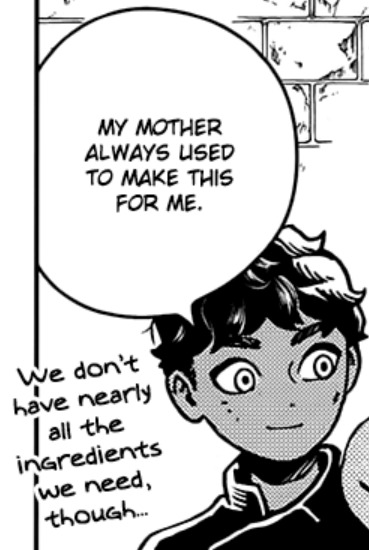

Kabru says he ate this stew as a child, that he hasn't had it in a long time, and that he's looking forward to having it again. He says he is relying on childhood memories in order to make the stew.
If this stew is something Milsiril made for him, why did she stop making it? Why hasn't Kabru had it in a long time? Was there a goat blight for the last 10 years? Did she stop making it to punish Kabru for wanting to leave her? This seems like important information Kui would have told us.
The much more logical assumption is that Kabru's birth mother, who died when he was 7, is the one that made lamb stew, and that's why Kabru hasn't had it in a long time, struggles to remember how to make it, and also why he's so excited to eat it.
This is in direct contrast with the elf fruit cake that Milsiril forced Kabru to eat as a child. Kabru's birth mother made him something he loves, that he is eager to eat again, while Milsiril forced him to eat elf cake so often that it has become his most disliked food.
Kabru and Ryoko Kui never refer to Milsiril as Kabru's mother, the phrase “foster parent” (養母 or 育ての親が, lit. meaning “parent who raised me” in contrast with a birth/blood parent) is used instead in both the manga itself and in the World Guide.
There are several other things like this (how Kabru talks about Milsiril) which I think makes it clear that Kabru probably doesn't call Milsiril mother willingly, and that he goes out of his way to put distance between her and himself. He doesn't hate her, but he doesn't want her to be a part of his life.
Milsiril is a wealthy noble in a society where women are equal to men. It's unlikely that she personally does much cooking, and even if she does cook as a hobby, it's unlikely that Kabru watched her butcher a goat - servants or the butcher would prepare the meat for her.
Milsiril is a fussy eater, and hates most foods. Goat tends to have a strong flavor and is sometimes gamey. I don't think she'd eat goat... Meanwhile, as I stated previously, goat is a delicacy in Nepal, so it would make perfect sense for goat to be a special treat Kabru grew up eating.
Yes, Milsiril sometimes does things she doesn't want to do because Kabru asks... But both examples we have of this, she tries to turn it into a punishment. She explicitly says she's training Kabru so that he'll give up, not because she wants him to get strong and succeed. She wants him to fail. She takes him to her family reunion to prove to Kabru that it's unpleasant, so he won't want to go again. Both times this tactic doesn't work, but she clearly states that this is her intent.
I could go on about this for hours, but this post is really about goat stew!!! But just wanted to throw that in there in case anybody is confused about who exactly cooked goat stew for Kabru.
As I said, there's always the possibility that I'm wrong, but I think the evidence is pretty overwhelming that when Kabru says "my mother cooked this for me" he isn't talking about Milsiril.
#dungeon meshi#delicious in dungeon#kabru#dunmeshi#talking mushroom#dungeon meshi research#kabru of utaya#kabru dungeon meshi#analysis#The Essay#Dungeon Meshi Research
38 notes
·
View notes
Text
A gigantic list of the maximum possible War Asset value and how you'd get them. Yes, I know it's cluttered and inconsistent and I maybe did the math wrong or missed an asset entirely but shut up its 4:25 AM rn
FLAT VALUES WITHOUT PENALTIES
AVAILABLE REGARDLESS OF CHOICES
(Can be lost by not completing the requisite quests before certain points, generally do these as soon as you can so you don’t risk them being locked later - Choosing not to do any of these is not considered a choice for the sake of this list - Some may require a choice to be made, but the alternative would be zero assets) (Note: Whichever reputation check answer you give during one of Diana Allers’s interviews will add 5 points to one of your assets. For the sake of this list, whichever asset is seen first in the list gets the bonus 5, but it really doesn’t matter, it all adds to the same final value if they do them.)
Terminus Fleet:
Base 50 - Speak to Aria at Purgatory after Priority: Palaven
Plus 50 - Complete Aria: Blood Pack
Plus 50 - Complete Aria: Eclipse
Plus 50 - Complete Aria: Blue Suns
Total 200
Volus Dreadnought Kwunu:
Base 50 - Aethon Cluster, Esori, Solu Paolis
Shadow Broker Support Team:
Base 40 - Hourglass Nebula, Sowilo, Hagalaz
Elcor Flotilla:
Base 40 - Silean Nebula, Phontes, Oltan
Shadow Broker Wet Squad:
Base 25 - Krogan DMZ, Dranek, Rothla
Governor Grothan Pazness:
Base 20 - Kite’s Nest, Indris, Cholis
Void Devils Fighter Wing:
Base 30 - The Shrike Abyssal, Kyzil, Heshtok
Vorcha Labor Team:
Base 15 - The Shrike Abyssal, Thal, Tyrix
Liquid Assets:
Base 40 - Crescent Nebula, Tasale, Illium
Leviathan Enthrallment Team:
Base 400 - Complete Leviathan DLC
Omega Eezo Hoard:
Base 300 - Complete Omega DLC
Omega Raiding Fleet:
Base 75 - Complete Omega DLC
Arcturus First Division:
Base 60 - Complete N7: Cerberus Abductions
Alliance Engineering Corps:
Base 130 - Obtained automatically
Plus 40 - Complete Valhallan Threshold: Prothean Data Drives
Plus 40 - Complete Hades Nexus: Obelisk of Karza
Plus 40 - Complete Hades Nexus: Prothean Sphere
Plus 40 - Complete Athena Nebula: Hesperia-Period Statue
Toal 290
Alliance Cruiser Shanghai:
Base 40 - Exodus Cluster, Asgard, Terra Nova
Rogue Fighter Pilots:
Base 20 - Complete Cortez’s subplot conversations and meetings
Diana Allers:
Base 5 - Recruit at docking bay
Eden Prime Support:
Base 25 - Complete Priority: Eden Prime
Plus 25 - Retrieve one piece of intel during mission
Plus 25 - Retrieve two pieces of intel during mission
Plus 25 - Retrieve three pieces of intel during mission
Total 100
Alliance Naval Exploration Flotilla:
Base 75 - Exodus Cluster, Asgard, Tyr
Communications Arrays:
Base 50 - Complete N7: Communication Hub
Alliance Sixth Fleet:
Base 90 - Complete Priority: Horizon
Alliance Spec Ops Team Delta:
Base 35 - Exodus Cluster, Asgard, Loki
Synthdiamond Heat Sinks:
Base 25 - Caleston Rift, Balor, Bres
Asari Science Team:
Base 90 - Complete Priority: The Citadel II
Asari Second Fleet:
Base 90 - Complete Priority: The Citadel II
Plus 25 - Encourage Liara to talk to Aethya in Presidium Commons prior to Priority: Tuchanka
Plus 8 - Complete Citadel: Reaper Code Fragments
Total 123
Asari Sixth Fleet:
Base 90 - Complete Priority: The Citadel II
Base 40 - Complete Nimbus Cluster: Library of Asha
Total 130
Asari Commandos:
Base 20 - Complete Kallini: Ardat-Yakshi Monastery
Dr. Jelize:
Base 25 - Silean Nebula, Kypladon, Hanalei
Armali Sniper Unit:
Base 30 - Silean Nebula, Loropi, Yasilium
Serrice Guard:
Base 30 - Silean Nebula, Nahuala, Hyetiana
Asari Cruiser Nefrane:
Base 30 - Athena Nebula, Tomaros, Pronoia
Asari Research Ships:
Base 35 - Athena Nebula, Orisoni, Gaelic
Asari Cruiser Cybaen:
Base 30 - Athena Nebula, Parnitha, Tevura
Asari Engineers:
Base 30 - Athena Nebula, Ialessa, Trikalon
Husk Neural Map:
Base 30 - Sigurd’s Cradle, Mil, Chalkhos
Advanced Starship Fuel:
Base 75 - Complete N7: Fuel Reactors
Javelin Missile Launchers:
Base 50 - Sigurd’s Cradle, Skepsis, Watson
Volus Fabrication Units:
Base 45 - Aethon Cluster, Aru, Cherk Sab
Volus Engineering Team:
Base 50 - Aethon Cluster, Satu Arrd, Nalisin
Interferometric Array:
Base 45 - Attican Beta, Hercules, Eletania
ExoGeni Scientists:
Base 40 - Attican Beta, Theseus, Feros
Prothean Data Files:
Base 75 - Exodus Cluster, Utopia, Zion
Shadow Broker Starship Tech:
Base 50 - Hourglass Nebula, Faryar, Alingon
Terminus Freighters:
Base 30 - Hourglass Nebula, Ploitari, Zanethu
Element Zero Converter:
Base 50 - Vallhallan Threshold, Micah, Farlas
Emergency Fuel Pods:
Base 30 - Vallhallan Threshold, Micah, Elohi
Advanced Power Relays:
Base 50 - Argos Rho, Gorgon, Camaron
Haptic Optics Array:
Base 50 - Argos Rho, Hydra, Canrum
Jovian Dissertation:
Base 5 - Pylos Nebula, Nariph, Isale
Radiation Shielding Sheath:
Base 25 - Pylos Nebula, Dirada, Sineus
Cerberus Research Data:
Base 50 - Complete N7: Cerberus Lab
Advanced Fighter Squadron:
Base 75 - N7: Cerberus Fighter Base
Ex-Cerberus Scientists:
Base 25 - Arrae: Ex-Cerberus Scientists
Dr. Brynn Cole:
Base 25 - Arrae: Ex-Cerberus Scientists
Krogan First Division:
Base 50 - N7: Cerberus Attack
Admiral Zaal’Koris:
Base 25 - Complete Rannoch: Admiral Koris; pass reputation check to convince Koris to be rescued
Turian 79th Flotilla:
Base 40 - Apien Crest, Gemmae, Pheiros
Turian 43rd Marine Division:
Base 90 - Complete Priority: Tuchanka
Turian Seventh Fleet:
Base 90 - Completely Priority: Tuchanka
Plus 5 - Complete Citadel: Medi-Gel Sabotage
Plus 40 - Complete Apien Crest: Banner of the First Regiment
Plus 5 - Renegade answer to Allers interview after Priority: Tuchanka
Total 140
Turian Blackwatch:
Base 75 - Complete Tuchanka: Bomb
Turian Engineering Corps:
Base 110 - Complete Priority: Tuchanka
Turian Spec Ops Team:
Base 40 - Argos Rho, Phoenix, Pinnacle Station
Dextro Rations:
Base 10 - Sigurd’s Cradle, Lenal, Triginta Petra
Dr. Ann Bryson:
Base 20 - Don’t take either renegade interrupts while she is indoctrinated at the lab
TOTAL: 4,073
ASSETS DETERMINED ONLY BY MASS EFFECT 1 CHOICES
Alliance Fifth Fleet:
Base 90 - Obtained automatically
Plus 15 - Hades Nexus, Hekate, Asteria
Minus 25 - Saved council in ME1
Plus 5 - Warn two businessmen on the Citadel
Plus 8 - Citadel: Improved Power Grid
Plus 7 - Authorize: Civilian Consultant Authorization at Spectre Terminal
Plus 5 - Renegade answer to Allers interview after Priority: The Citadel II
Plus 8 - Complete Citadel: Cerberus Ciphers
Total 113
Zhu’s Hope Colonists:
Base 30 - Save all colonists and spare Shiala in Feros: The Thorian in ME1
The Destiny Ascension:
Base 70 - Save Council in ME1
Salarian Special Tasks Group:
Base 35 - Getting Kirrahe killed in ME1, speaking to Tolan at starting area of Priority: Sur’Kesh
Urdnot Wreav:
Base 25 - Kill Wrex on Virmire or do not recruit him in ME1
Clan Urdnot:
Base 300 - Complete Priority: Tuchanka (Wreav needs to be leader to avoid losing asset later)
SUBTOTAL: 573
TOTAL: 4,646
ASSETS DETERMINED ONLY BY MASS EFFECT 2 CHOICES
(Note: either choice in Legion: A House Divided will result in the same final value IF peace is brokered between the Geth and Quarians in ME3. This list will assume the geth heretics were destroyed)
(For the 103rd Marine Division, technically choosing to skip Arrival reduces the strength by 50, thus its placement)
Spectre Unit:
Base 40 - Complete Citadel: Hanar Diplomat w/ loyal and alive Kasumi
Hanar and Drell Forces:
Base 50 - Complete Citadel: Hanar Diplomat w/ loyal and alive Kasumi
Dr. Karin Chakwas:
Base 10 - Saved from Collector’s in ME2, told to stay at labs
Kahlee Sanders:
Base 20 - Complete Grissom Academy: Emergency Evacuation
Plus 5 - Save all students in mission
Plus 5 - Stopped Project Overlord and saved David
Total 30
Jack:
Base 25 - Survived ME2 and completed Grissom Academy: Emergency Evacuation
Alliance Frigate Normandy SR-2:
Base 50 - Obtained automatically
Plus 15 - Installed Thanix Cannon from Garrus in ME2
Plus 25 - Installed Silaris Armor from Jacob in ME2
Plus 25 - Installed Cyclonic Barrier Technology from Tali in ME2
Plus 35 - Complete Citadel Docks: Retake the Normandy
Plus 35 - Complete Citadel: Party
Total 185
Mineral Resources:
Base 100 - 75,000 to 100,000 each element, must be collected pre-Suicide Mission
Kasumi Goto:
Base 25 - Complete Citadel: Hanar Diplomat w/ Kasumi Loyal and alive at the end of ME2
Zaeed Massani:
Base 25 - Complete Citadel: Volus Ambassador w/ Zaeed loyal and alive at the end of ME2, talk to him at the Citadel Holding Area
Samara:
Base 25 - Complete Kallini: Ardat-Yakshi Monastery with Samara having survived in ME2 and taking the paragon interrupt to keep her alive at the end of the mission
Optimized Eezo Capacitors:
Base 15 - Saved Donnelly and Daniels in ME2, pardon from Spectre terminal in ME3, complete Citadel: GX12 Thermal Pipe
Reaper Brain:
Base 110 - Save Collector Base in ME2, complete Priority: Cerberus Headquarters
Dr. Gavin Archer:
Base 25 - Saved David from Overlord in ME2, complete Grissom Academy: Emergency Evacuation and Arrae: Ex-Cerberus Scientists
Jacob Taylor:
Base 25 - Complete Arrae: Ex-Cerberus w/ Jacob alive from ME2
Ex-Cerberus Engineers:
Base 10 - Flirt with Kelly enough to invite her to dinner and save her from Collectors in ME2. Convince to change identity on the Citadel, do not pick renegade option when told she was a spy.
Mirana Lawson:
Base 25 - Complete Priority: Horizon w/ a surviving Miranda from ME2 AND after talking to her all three times on Citadel, given alliance access, and warned about Kai Leng after reading dossier from private terminal
Geth Corps:
Base 300 - Complete Priority: Rannoch, make peace
Plus 5 - Paragon answer during Allers interview after Priority: Rannoch
Total 305
Geth Fleet:
Base 300 - Complete Priority: Rannoch, make peace
Minus 150 - Heretics destroyed, make peace
Total 150
Geth Prime Platoon
Base 60 - Complete Priority: Rannoch, make peace
Grunt:
Base 25 - Complete Attican Traverse: Krogan Team w/ loyal and alive Grunt from ME2
Krogan Clans:
Base 300 - Complete Priority: Tuchanka
Plus 40 - Complete Citadel: Kakliosaur Fossil
Minus 50 - Destroy Maelon’s data in ME2, causes Eve’s death
Total 290
Quarian Civilian Fleet:
Base 200 - Complete Priority: Rannoch, make peace
Plus 50 - Destroy Geth Heretics in ME2
Total 250
Quarian Heavy Fleet:
Base 200 - Complete Priority: Rannoch, make peace
Plus 25 - Support Admiral Gerrel in argument after Rannoch: Admiral Koris
Plus 50 - Destroy Geth Heretics in ME2
Total 275
Quarian Patrol Fleet:
Base 200 - Complete Priority: Rannoch, make peace
Plus 50 - Destroy Geth Heretics in ME2
Total 250
Dr. Mordin Solus:
Base 25 - Complete Priority Tuchanka w/ alive Mordin Solus AND with Wrex and Eve dead convince him to sabotage cure
103rd Marine Division:
Base 100 - Obtained automatically
Plus 20 - Hades Gamma, Plutus, Nonuel
Plus 25 - Nubian Expanse, Kalabsha, Yamm
Total 145
SUBTOTAL: 2,475
TOTAL: 7,121
ASSETS DETERMINED ONLY BY MASS EFFECT 3 CHOICES
(Note: Killing or sparing Petrovsky results in the same end value. For the sake of this, killing him is taken + convincing Din lets you avoid a point penalty on Turiain Sixth Fleet + sparing Balak avoids point penalty on Alliance Third, thus placement)
Volus Bombing Fleet:
Base 75 - Complete Citadel: Volus Ambassador via reputation speech check
Citadel Defense Force:
Base 10 - Complete Priority: The Citadel II
Plus 7 - Support Dock Officer in argument
Plus 5 - Support Reluctant Civilian in argument
Plus 0 (optional) - Support Arguing Couple
Plus 8 - Authorize Partner Benefits at Spectre Terminal
Plus 7 - Authorize Civilian Deportation Order at Spectre Terminal
Plus 7 - Authorize Medical Supplies at Spectre Terminal
Plus 7 - Authorize Surveillance Authorization at Spectre Terminal
Plus 7 - Supported Worried Merchant over Angry Merchant, and authorize Militia at Spectre Terminal
Plus 5 - Authorize Citadel Entry at Spectre Terminal after Grissom Academy
Plus 5 - Supported Cafe Owner over Frustrated C-Sec officer
Plus 5 - Speak to bank teller in Commons
Plus 8 - Complete Citadel: Target Jamming Technology
Plus 8 - Complete Citadel: Cerberus Automated Turret Schematics
Plus 8 - Complete Citadel: Biotic Amp Interfaces
Plus 40 - Complete Irune: Book of Plenix
Plus 40 - Complete Dekuuna: Code of the Ancients
Plus 40 - Complete Silean Nebula: Rings of Alune
Total 217
Biotic Company:
Base 75 - Complete Grissom Academy: Emergency Evacuation, sending students to the war
Advanced AI Relays:
Base 45 - Support Admiral Xen over Tali after Rannoch: Geth Fighter Squadrons
Turian Sixth Fleet:
Base 135 - Complete Priority: The Citadel II
Plus 8 - Complete Citadel: Cerberus Turian Poison
Total 143
Salarian First Fleet:
Base 150 - Complete Priority: Tuchanka by sabotaging genophage cure
SUBTOTAL: 705
TOTAL: 7,826
ASSETS DETERMINED BY CHOICES FROM MULTIPLE GAMES
Rachni Workers:
Base 100 - Complete Attican Traverse: Krogan Team w/ saved Rachni Queen from ME1, saved again here
Batarian Fleet:
Base 100 - Complete Citadel: Batarian Codes, convince Balak to join war effort
Plus 15 - Complete Citadel: Batarian Codes, convince alive Balak
Plus 40 - Complete Kite’s Nest: Pillars of Strength
Total 155
Alliance First Fleet:
Base 90 - Obtained automatically
Plus 15 - Hades Gamma, Farinata, Juntauma
Plus 30 - Complete Omega DLC killing Petrovsky
Plus 15 - Hades Nexus, Pamyat, Dobrovolski
Minus 25 - Save Council in ME1
Plus 8 - Complete Citadel: Chemical Treatment
Total 133
Alliance Third Fleet:
Base 90 - Obtained automatically
Plus 25 - Gemini Sigma, Ming, Parag
Plus 15 - Nubian Expanse, Qertassi, Norehsa
Minus 25 - Save Council in ME1
Minus 4 - Private Talavi’s transfer request granted*
Total 101 *I have no clue who Talavi is but I’m including anyway because I have zero clue if it happens without intervention or with intervention
Khalisah Bint Sinan al-Jilani:
Base 5 - Paragon interrupt during interview during Priority: Citadel I
Plus 5 - Never punch her throughout the trilogy. Hard, I know.
Total 10
Ashley Williams/Kaiden Alenko:
Base 25 - Decide who survives Virmire in ME1. Keep them alive at the end of Priority: The Citadel II and deny them back on the Normandy
Dark Energy Dissertation:
Base 1 - Interact with Conrad Verner in ME1 and ME2 WITHOUT letting him die. Talk to him during Citadel: Medi-Gel Sabotage
Plus 4 - Complete Feros: Data Recovery, UNC: Asari Writings and buy Elkoss Combine Amory License all in ME1
Total 5
Salarian Third Fleet:
Base 125 - Complete Priority: The Citadel II w/ alive Thane that has been spoken to at the Hospital prior.
Plus 8 - Complete Citadel: Heating Unit Stabilizers
Total 133
SUBTOTAL: 662
TOTAL: 8,488
#mass effect#mass effect 3#mass effect 2#mass effect trilogy#this was stupid#video games#mass effect legendary edition
10 notes
·
View notes
Text
WHY IS THE SPEED OF LIGHT CONSTANT??
Blog#303
Wednesday, June 7th, 2023
Welcome back,
The speed of light in a vacuum is 299,792,458 metres per second, a figure scientists finally agreed on in 1975 – but why settle on that figure? And why does it matter?
Answering those questions takes us on an amazing journey through space, time, physics and measurement, and the tale hasn't quite been told yet. Modern-day studies are calling into question the speed of light for the first time in centuries.

To start at the start though, some history: at the beginning of the 17th century, the general consensus was that light didn't have a speed, that it just appeared instantaneously, either present or not.
During the 1600s this idea was seriously challenged. First, by Dutch scientist Isaac Beeckman in 1629, who set up a series of mirrors around a gunpowder explosions to see if observers noticed any difference in the when the flashes of light appeared.

Unfortunately for Beeckman and the progress of science, the results were inconclusive, but then in 1676 Danish astronomer Ole Rømer noticed strange variations in the eclipse times of one of Jupiter's moons over the course of a year.
Could this be because light took a longer time to travel from Jupiter when Earth was further away? Rømer thought so, and his rough calculations put the speed of light at about 220,000 kilometres per second – not a bad estimate at all, especially considering the data he would have had on planet sizes wasn't all that accurate.

Further experiments with beams of light on our own planet edged scientists closer to the right number, and then in the mid-1800s physicist James Clerk Maxwell introduced his Maxwell's equations – ways of measuring electric and magnetic fields in a vacuum.
Maxwell's equations fixed the electric and magnetic properties of empty space, and after noting that the speed of a massless electromagnetic radiation wave was very close to the supposed speed of light, Maxwell suggested they might match exactly.

It turns out Maxwell was right, and for the first time we could measure the speed of light based on other constants in the Universe.
At the same time, Maxwell's work strongly suggested that light was itself an electromagnetic wave, and after this idea was confirmed, it got picked up by Albert Einstein in 1905 as part of his theory of special relativity.
Today the speed of light, or c as it's commonly known, is considered the cornerstone of special relativity – unlike space and time, the speed of light is constant, independent of the observer.

What's more, this constant underpins much of what we understand about the Universe. It matches the speed of a gravitational wave, and yes, it's the same c that's in the famous equation E=mc2.
We don't just have the word of Maxwell and Einstein for what the speed of light is, though. Scientists have measured it by bouncing lasers back from objects and watching the way gravity acts on planets, and all these experiments come up with the same figure.

However, the story doesn't quite end there, thanks to quantum theory, that branch of physics hinting that the Universe might not be quite as constant as we think.
Quantum field theory says that a vacuum is never really empty: it's filled with elementary particles, rapidly popping in and out of existence. These particles create electromagnetic ripples along the way, the hypothesis goes, and could potentially cause variations in the speed of light.
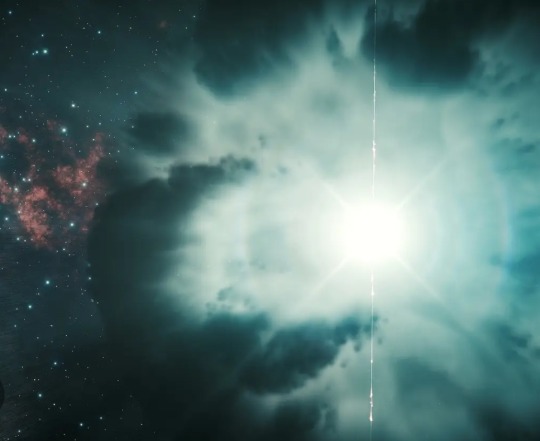
Studies into these ideas are ongoing, and we don't know for sure one way or the other yet. For now, the speed of light remains the same as it has for centuries, constant and fixed.
Originally published on sciencealert-com
COMING UP!!
(Saturday, June 10th, 2023)
"WHAT WAS BEFORE THE BIG BANG??"
#astronomy#outer space#alternate universe#astrophysics#spacecraft#universe#white universe#space#parallel universe#astrophotography
210 notes
·
View notes
Text
The Schizoid Man
Better than I thought it was gonna be!
I was going in thinking this going to be another de-mystifying of Data's backstory, but it really isn't, beyond adding that Data's creator had a mentor, which I don't think is a big deal (if we already have a concrete creator anyway).
Oki I have to talk about the story structure again, because it's kinda like The Outrageous Okona and Loud As a Whisper again (at least in the a plots). We have a guest character, exploring whom the bulk of the episode is dedicated to. And then we have the crew intervening in a way that doesn't force the guest star to change, but inspires them to do so anyway (here Picard's outrage over Graves' accidental harming of the crew gets through to him). Admittedly, here the crew is more active, as they investigate Graves-as-Data beforehand, but the only thing that really advances the plot is Picard's appealing to Graves (and subsequent getting hit by him).
That's not really a complaint and more of an observation, btw. I do think that TNG is getting better and better at this.
It's kind of interesting how this is a Data episode but he's barely in it. And that's not a criticism, I think we learn a lot about Data here, by the hole that he leaves behind so to speak. It's quite clever how the episode manages to highlight so many of Data's qualities and discuss, I think quite positively, his relationship to humanity, by showing how Ira Graves is.
Which, side note, who the fuck names a planet Gravesworld. Like namig it after yourself is one thing, but Gravesworld?
but okay, Graves is obviously a huge sexist asshole, but I gotta admire the vanity of killing someone to prolong your own life, barely even make an attempt to impersonate them, then going to your own funeral (as the guy who's met you once) and hold a long-winded speech about how you were the greatest specialist little guy under the great bird of the galaxy's limitless sky.
honestly goals
minus the dehumanizing women and murdering and so on, you get it.
I love that this episode openly acknowledges that Data is kind of human. Like, Geordi explicitely mentions Data's human qualities surfacing, which is great. It also does that without downplaying Data's struggle and quest for being more like the other crew, which is also nice, and it also does that while emphasising that Data being just like he is is also really good (via Picard telling Graves literally that). So honestly, this is everything I want out of a Data episode.
I liked the story Graves told Data about the machine that wanted to be human only learn that he was human after all. it kinda feels like that's what the episode wants Data to have (in the long game, not necessarily by the end of this episode)
Also I call bullshit on Data not feeling pain, just two episodes ago you were about to cry because Guinan tricked you into thinking you were funny. Like that was absolutely pain, or at least a genuine expression of it. Fine if it doesn't map 1:1 on human expression of pain, but it is clearly something.
I think it's super super interesting that Troi was able to sense Grave's jelousy while Graves was posession Data. That means that there is no physical restriction in Data's positronic brain that makes it inherently unable to feel those emotions in a way that Troi can perceive, and it means that Data is generally capable of feeling emotions (even if not necessarily human ones). Of course we knew that already from observing Data expressing emotions all the time, but it's nice to have it spelled out, kinda.
Kind of a minor aspect, but seeing Doctor Selar here is SOOOO surreal. For those not in the know, she becomes a main character on the long-running New Frontier novel series, and her portrayal there has in my brain totally eclipsed her five tv appearances. So it's incredibly strange to see her be like a person and saying words instead of being text that evokes pictures in my imagination.
Also, is it just me or is something weird going on with Doctor Pulaski? Like, they have an episode with a significant medical component (Graves' illness), and instead of using Pulaski for it, they invent a new character with the same job who gets more lines than her? I dunno, it just seems like a weird choice. It's not like she wasn't in this episode at all either.
I'm taking Kareen's mistaking a Klingon for a Romulan as another instance of TNG trying to deemphasize the connection between Romulans and Vulcans. Kareen seems at least familiar with Vulcans (she doesn't have questions about Selar), but Worf is just a random alien to her, that could be a Romulan. To any viewer unfamiliar with TOS that woul communicate (subtely) that Romulans are not easily confused with Vulcans.
I find it funny that Graves accuses Picard of flirting with Kareen. Like. Look. Picard has many faults, as I love to point out, but coming onto a woman who spend almost all her life in the company of one single other person, who has just died, is not one of them.
#the next generation rewatch#star trek#star trek tng#tng#star trek the next generation#this post was exiled by the queue continuum
8 notes
·
View notes